-
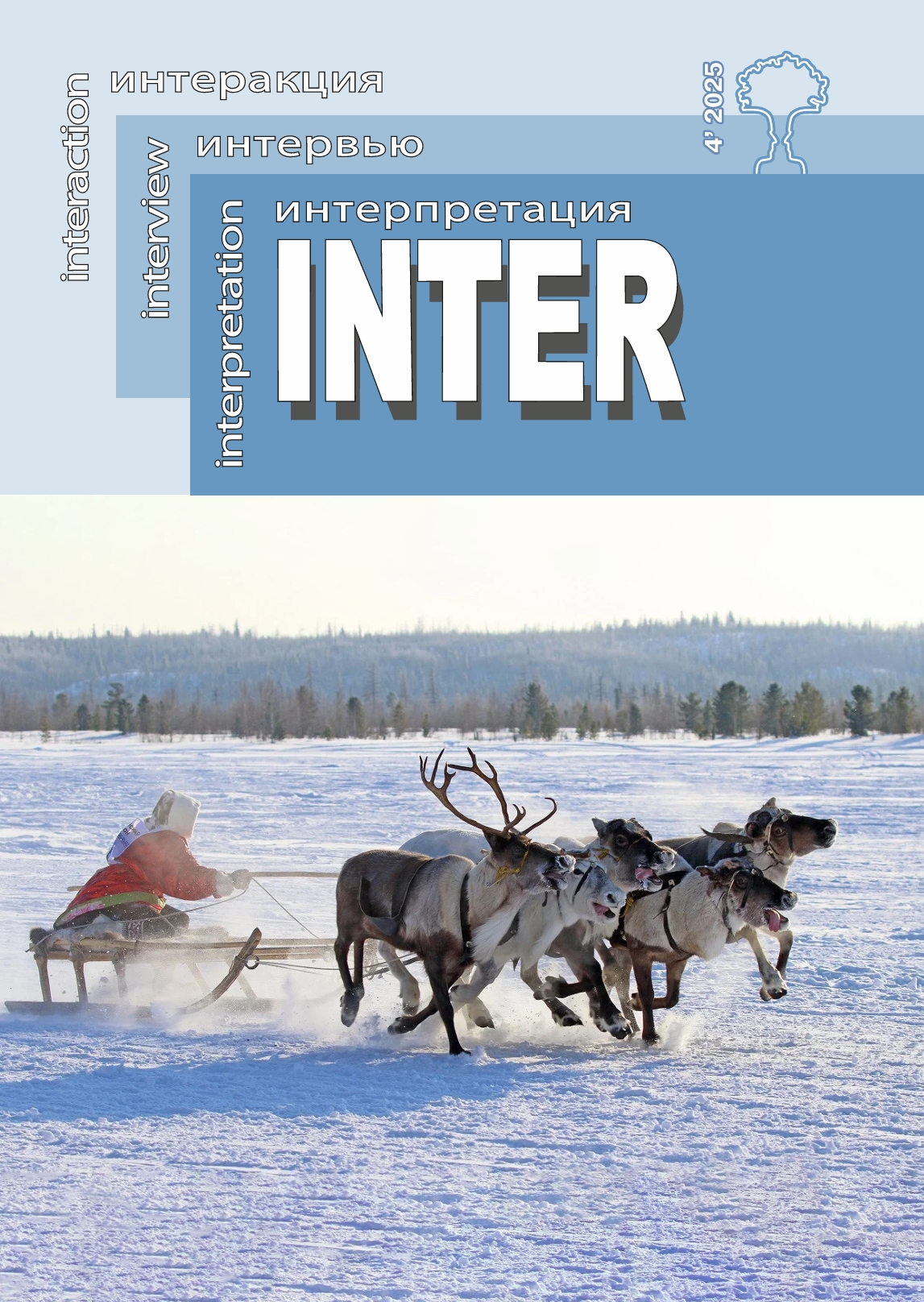 Интер 4 2025
Том 17 № 4 (2025)В новом номере - рефлексия о методологии полевых исследований и переосмысление этнографических подходов на разнообразных примерах. Экологические катастрофы, глобальные и локальные конфликты, изменение форм труда и досуга, трансформации старых профессий и возникновение новых - сюжеты, которые, благодаря включенности исследователей, становятся аналитическими примерами влияния структурных трансформаций на проявление субъектности людей. География исследований, представленных в статьях номера, охватывает несколько регионов России, включая Краснодарский край, Московский регион, Республику Бурятия и Чукотку. Такой масштаб предоставляет нашим читателям возможность познакомиться с повседневностью в разных локациях.
Интер 4 2025
Том 17 № 4 (2025)В новом номере - рефлексия о методологии полевых исследований и переосмысление этнографических подходов на разнообразных примерах. Экологические катастрофы, глобальные и локальные конфликты, изменение форм труда и досуга, трансформации старых профессий и возникновение новых - сюжеты, которые, благодаря включенности исследователей, становятся аналитическими примерами влияния структурных трансформаций на проявление субъектности людей. География исследований, представленных в статьях номера, охватывает несколько регионов России, включая Краснодарский край, Московский регион, Республику Бурятия и Чукотку. Такой масштаб предоставляет нашим читателям возможность познакомиться с повседневностью в разных локациях. -
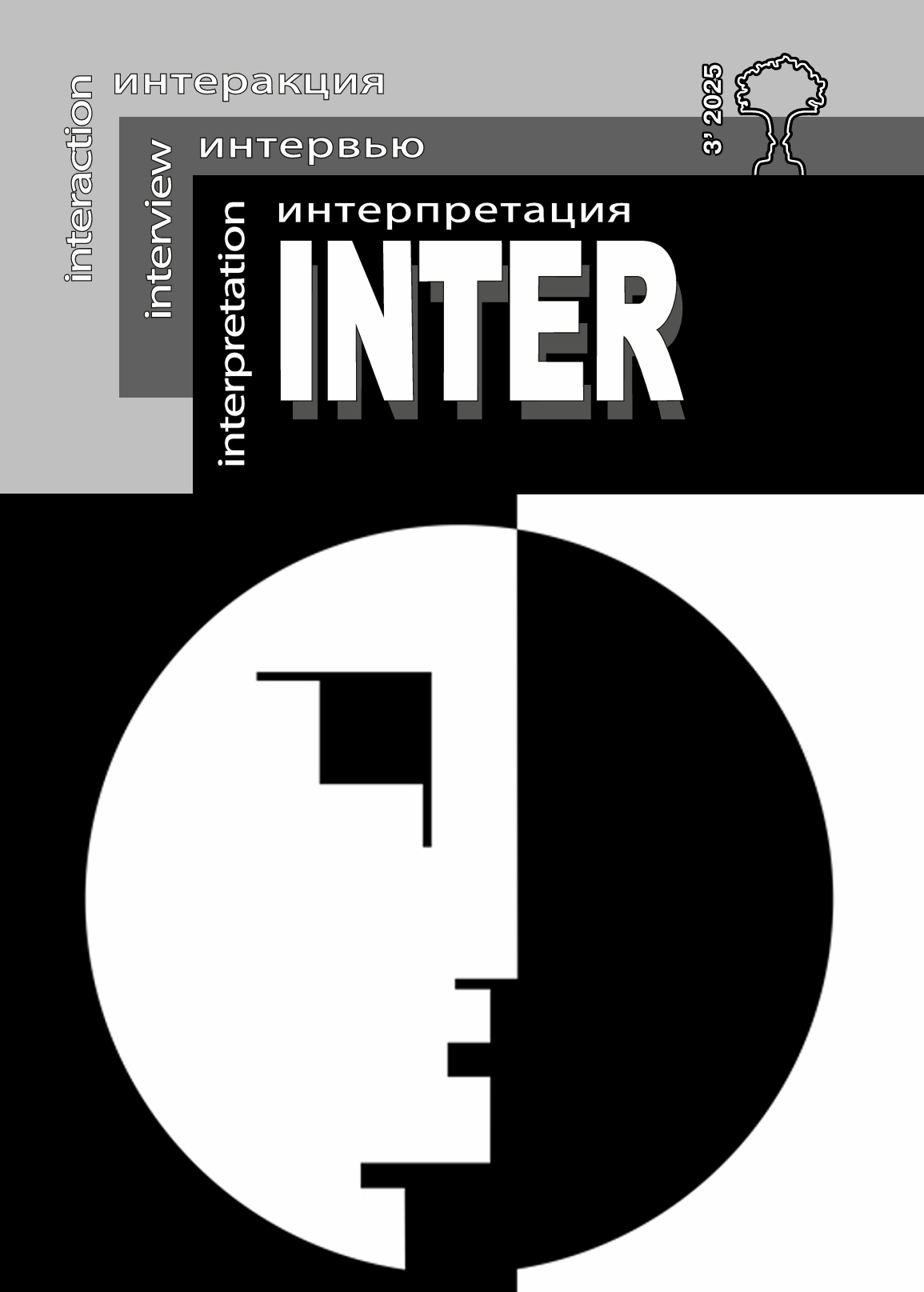 Интер 3 2025
Том 17 № 3 (2025)Этот номер собрал под своей обложкой результаты творческих поисков в основном молодых авторов в самых разнообразных сферах социальной жизни - начиная от документального кинематографа, поля литературной критики, религиозных сообществ до современного состояния средств массовой информации и проблемы фейк-новостей. Статьи разнообразны по жанру и подходам авторов, но есть один ракурс, который их объединяет - это рефлексия о способах формирования и проявления субъектности социальных акторов, будь то коллективные акторы или отдельные индивиды или даже субъектность самого исследователя при полевой работе со сложными социальными реалиями. Так, Е. Варфоломеев анализирует тему травматического прошлого с точки зрения носителей двух разных моделей социальной памяти, что является воплощением принципиально разных социальных субъектностей - двух социальных акторов, конкурирующих в борьбе за влияние на массовую аудиторию. А. Казун обращается к анализу потенциальных угроз фейк-новостей и констатирует, что новостные фейки могут быть способом формирования управляемого поведения. Е. Балацюк и Д. Володин рассматривают субъектность исследователя, его способность быть гибким, адаптироваться к различным жизненным мирам и соответствующим им когнитивным стилям. А. Рязанцев поднимает вопрос о том, из чего складывается репутация литератора в современном мире? Только ли из его литературных текстов или же из ряда других влияющих факторов, в том числе таких, как медийный образ и скандалы? В рубрике ИНТЕР-энциклопедия А. Моисеева и Е. Рождественская добавляют к нашей энциклопедии еще одну страницу – представляют дневниковый метод и рассуждают о его эвристическом потенциале.
Интер 3 2025
Том 17 № 3 (2025)Этот номер собрал под своей обложкой результаты творческих поисков в основном молодых авторов в самых разнообразных сферах социальной жизни - начиная от документального кинематографа, поля литературной критики, религиозных сообществ до современного состояния средств массовой информации и проблемы фейк-новостей. Статьи разнообразны по жанру и подходам авторов, но есть один ракурс, который их объединяет - это рефлексия о способах формирования и проявления субъектности социальных акторов, будь то коллективные акторы или отдельные индивиды или даже субъектность самого исследователя при полевой работе со сложными социальными реалиями. Так, Е. Варфоломеев анализирует тему травматического прошлого с точки зрения носителей двух разных моделей социальной памяти, что является воплощением принципиально разных социальных субъектностей - двух социальных акторов, конкурирующих в борьбе за влияние на массовую аудиторию. А. Казун обращается к анализу потенциальных угроз фейк-новостей и констатирует, что новостные фейки могут быть способом формирования управляемого поведения. Е. Балацюк и Д. Володин рассматривают субъектность исследователя, его способность быть гибким, адаптироваться к различным жизненным мирам и соответствующим им когнитивным стилям. А. Рязанцев поднимает вопрос о том, из чего складывается репутация литератора в современном мире? Только ли из его литературных текстов или же из ряда других влияющих факторов, в том числе таких, как медийный образ и скандалы? В рубрике ИНТЕР-энциклопедия А. Моисеева и Е. Рождественская добавляют к нашей энциклопедии еще одну страницу – представляют дневниковый метод и рассуждают о его эвристическом потенциале. -
 Интер 2 2025
Том 17 № 2 (2025)Этот номер развивает область интерпретативных социологических исследований жизненного пути (life course), сосредоточенных на изучении субъективных миров. В определенном смысле появление подхода жизненного пути – это реакция на современные социальные трансформации, в которых структурирование общества по привычным социологическим характеристикам пола, возраста, класса, утрачивает четкость и предсказуемость. В фокусе внимания авторов трансформации, которые российские информанты – преимущественно женщины – проходят в осмыслении старшего возраста, в способах воспринимать прошлое, настоящее и будущее. Статьи номера являются попыткой осмыслить старение российского общества. По мере развития этого процесса, интересы исследователей закономерно выходят за пределы возрастных групп, связанных с активным фертильным возрастом. Период активной жизни в старшем возрасте удлиняется, люди старшего возраста перестают быть невидимыми в обществе. Подход жизненного пути позволяет уйти от стереотипных нормативных представлений о старении и раскрывает этот феномен по-новому, обнаруживая пространства для разнообразных сценариев проживания старшего возраста, агентного осмысления жизненного опыта и отношений с обществом. Развитие подхода жизненного пути в контексте российского общества кажется важным и своевременным.
Интер 2 2025
Том 17 № 2 (2025)Этот номер развивает область интерпретативных социологических исследований жизненного пути (life course), сосредоточенных на изучении субъективных миров. В определенном смысле появление подхода жизненного пути – это реакция на современные социальные трансформации, в которых структурирование общества по привычным социологическим характеристикам пола, возраста, класса, утрачивает четкость и предсказуемость. В фокусе внимания авторов трансформации, которые российские информанты – преимущественно женщины – проходят в осмыслении старшего возраста, в способах воспринимать прошлое, настоящее и будущее. Статьи номера являются попыткой осмыслить старение российского общества. По мере развития этого процесса, интересы исследователей закономерно выходят за пределы возрастных групп, связанных с активным фертильным возрастом. Период активной жизни в старшем возрасте удлиняется, люди старшего возраста перестают быть невидимыми в обществе. Подход жизненного пути позволяет уйти от стереотипных нормативных представлений о старении и раскрывает этот феномен по-новому, обнаруживая пространства для разнообразных сценариев проживания старшего возраста, агентного осмысления жизненного опыта и отношений с обществом. Развитие подхода жизненного пути в контексте российского общества кажется важным и своевременным. -
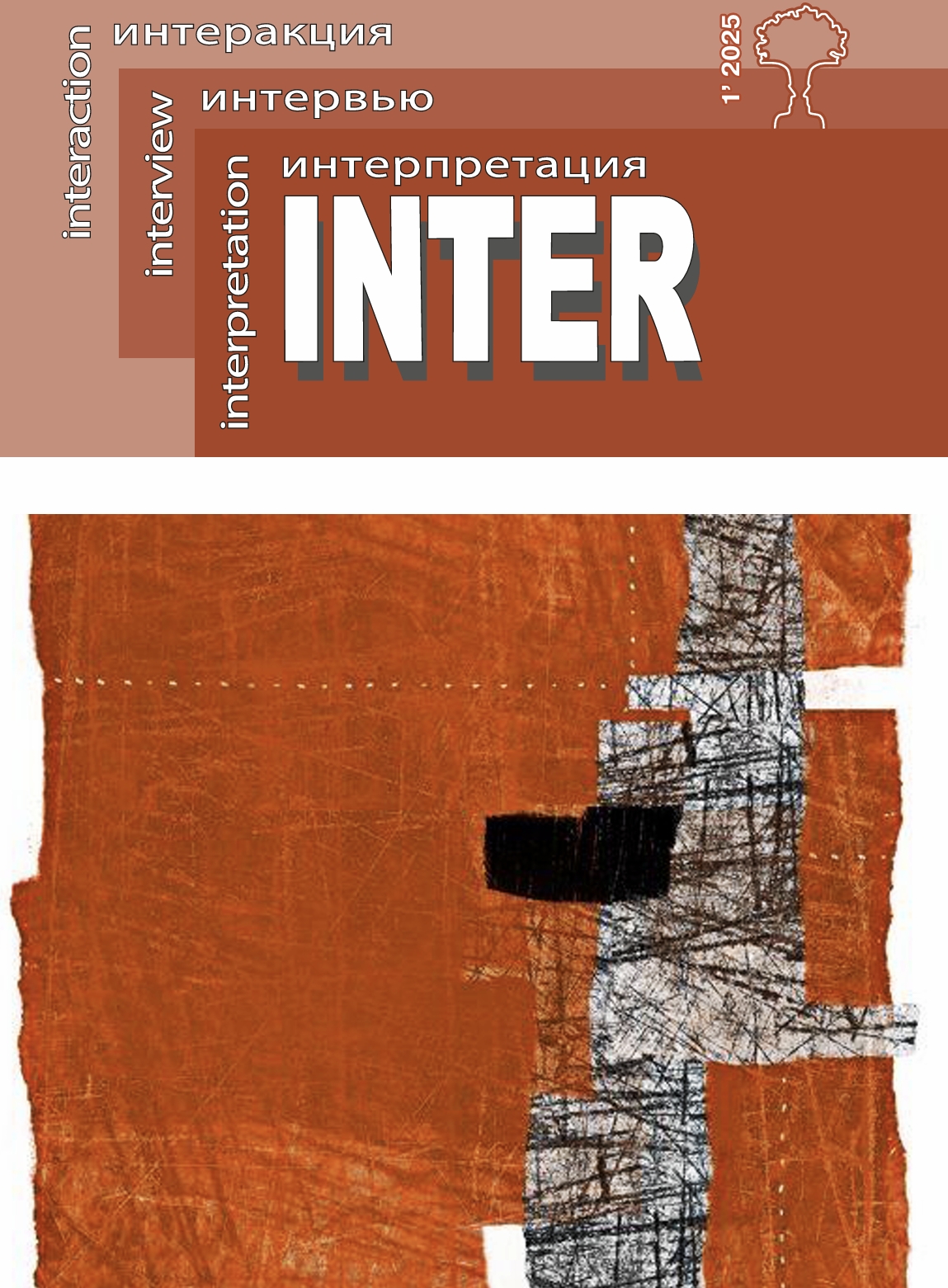 Интер №1 2025
Том 17 № 1 (2025)Первый номер 2025 года целиком и полностью отдан доминирующей теме социального феномена войны. В статьях этого специального выпуска - войны современные, гибридные, локальные конфликты, тема профессионального военного насилия, универсальные солдаты с их специфической маскулинностью и инвалидностью, военные в транзите между институтом армии и гражданским миром, отражение судьбы погибших на фронте в некрологе, нарративные жанры повествования о войнах, женщины, которые ждут воюющих дома, гражданская повседневность в тылу, попытка фотографии отразить исчезнувшее. Разнообразны и глобальны национальные и исторические контексты - «грязная война» в Аргентине в конце 70-х ХХ века, Афганская война 1979-1989 гг., Палестино-Израильский конфликт, СВО. Сложность темы войны, ее социальных последствий, феноменов, с нею связанных, необходимость социальной реабилитации комбатантов с опытом локальных конфликтов, порождает поиск методологических решений, как это исследовать, какими инструментами, пробираясь по «заминированному» эмпирическому полю, в котором полно означающих, но сложно подобраться к означаемому.
Интер №1 2025
Том 17 № 1 (2025)Первый номер 2025 года целиком и полностью отдан доминирующей теме социального феномена войны. В статьях этого специального выпуска - войны современные, гибридные, локальные конфликты, тема профессионального военного насилия, универсальные солдаты с их специфической маскулинностью и инвалидностью, военные в транзите между институтом армии и гражданским миром, отражение судьбы погибших на фронте в некрологе, нарративные жанры повествования о войнах, женщины, которые ждут воюющих дома, гражданская повседневность в тылу, попытка фотографии отразить исчезнувшее. Разнообразны и глобальны национальные и исторические контексты - «грязная война» в Аргентине в конце 70-х ХХ века, Афганская война 1979-1989 гг., Палестино-Израильский конфликт, СВО. Сложность темы войны, ее социальных последствий, феноменов, с нею связанных, необходимость социальной реабилитации комбатантов с опытом локальных конфликтов, порождает поиск методологических решений, как это исследовать, какими инструментами, пробираясь по «заминированному» эмпирическому полю, в котором полно означающих, но сложно подобраться к означаемому. -
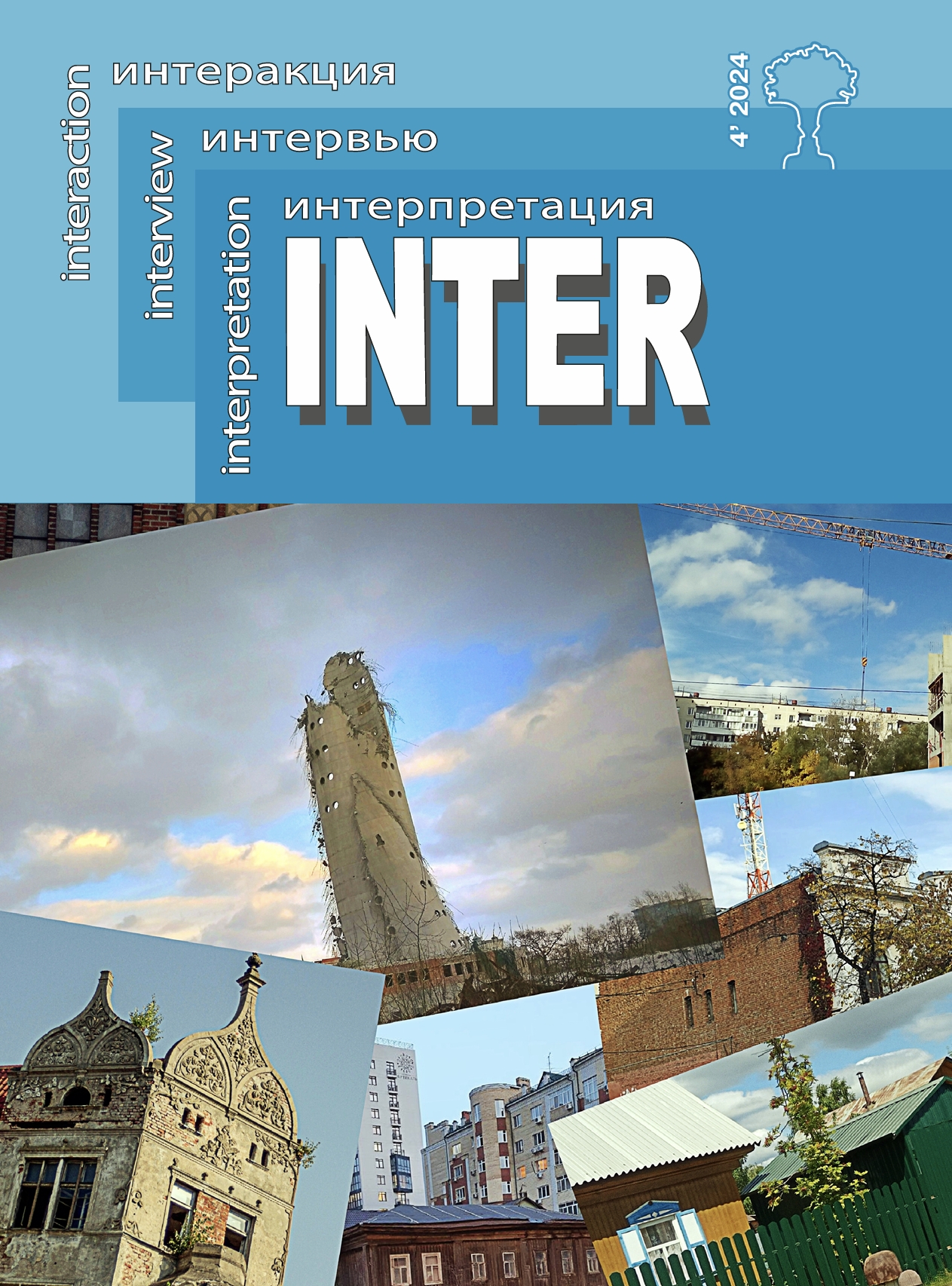 Интер №4 2024
Том 16 № 4 (2024)В последнем номере уходящего года переплетаются тематики пространства и эмоций в самых различных контекстах. Описывая свои — столь разные — сюжеты исследований, авторы очерчивают роль эмоций в привязке к пространству. Прежде всего это пространство города или локальной территориальной общности, в котором борьба за сохранение исторической среды или за поддержание привычного уклада жизни не только окрашивается эмоционально, но и выводит на поверхность не всегда очевидные и многослойные смыслы изучаемых мест, включая и трудноуловимое «чувство места». Открывает номер статья о ключевых направлениях heritage studies и аналитической интерпретации низовых практик присвоения наследия: его апроприации, коммодификации и рутинизации, а также тому, какое место уделяется наследию в пространстве современного города. Тема эмоциональной сопричастности месту подхватывается другими авторами номера. Эмоциональная «емкость» отдельных мест и уголков города позволяет в ряде случае описывать их через сценические метафоры, обозначая роли актеров и зрителей, выявляя типичные сценарии и используемые декорации. В эмоционально-пространственном ключе могут рассматриваться и более локальные объекты: от школьного класса до личных гаджетов.
Интер №4 2024
Том 16 № 4 (2024)В последнем номере уходящего года переплетаются тематики пространства и эмоций в самых различных контекстах. Описывая свои — столь разные — сюжеты исследований, авторы очерчивают роль эмоций в привязке к пространству. Прежде всего это пространство города или локальной территориальной общности, в котором борьба за сохранение исторической среды или за поддержание привычного уклада жизни не только окрашивается эмоционально, но и выводит на поверхность не всегда очевидные и многослойные смыслы изучаемых мест, включая и трудноуловимое «чувство места». Открывает номер статья о ключевых направлениях heritage studies и аналитической интерпретации низовых практик присвоения наследия: его апроприации, коммодификации и рутинизации, а также тому, какое место уделяется наследию в пространстве современного города. Тема эмоциональной сопричастности месту подхватывается другими авторами номера. Эмоциональная «емкость» отдельных мест и уголков города позволяет в ряде случае описывать их через сценические метафоры, обозначая роли актеров и зрителей, выявляя типичные сценарии и используемые декорации. В эмоционально-пространственном ключе могут рассматриваться и более локальные объекты: от школьного класса до личных гаджетов. -
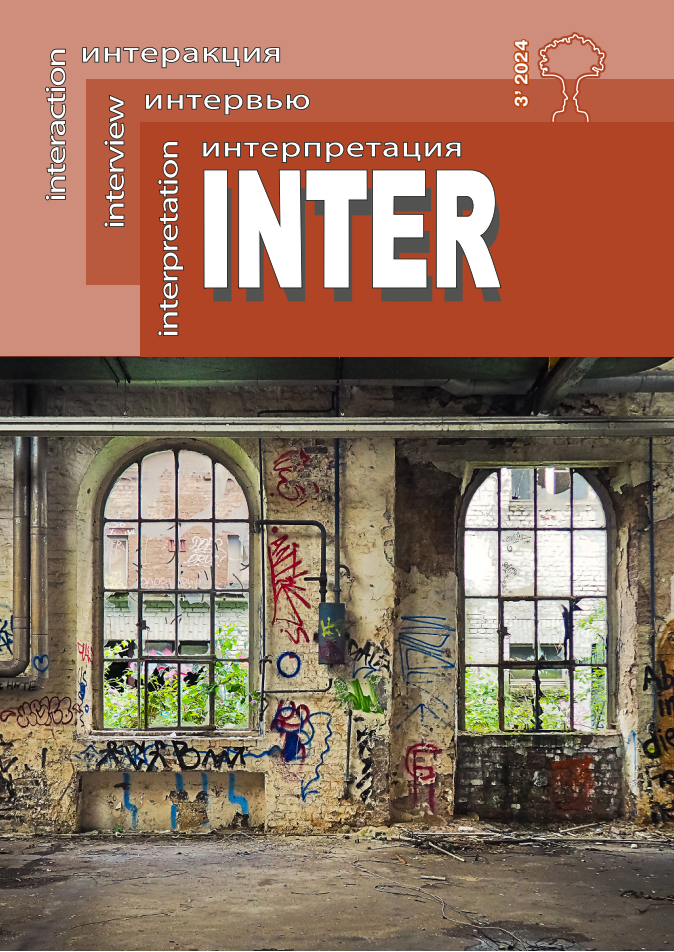 Интер №3 2024
Том 16 № 3 (2024)Осенний номер журнала ИНТЕР содержит два тематических блока, которые посвящены исследованиям деиндустриализации и социологии профессий. В рубрике «Теоретические дискурсы и дискуссии» авторы дебатируют о том, что делать с индустриальным наследием и каким может быть его будущее. Наталья Веселкова и Елена Прямикова рассуждают о проблеме соотношения индустриального и постиндустриального в пространстве российских городов, уделяя особое внимание малым городам Урала. На богатом исследовательском материале они показывают, как в развитии деиндустриализующихся территорий сочетаются остаточная «власть заводов» и возникающее креативно-туристическое направление. Евгения Гольман рассматривает возможности текстильного коллажа как художественного инструмента для работы с проблематичной индустриальной памятью на примере проекта «Лучезарный город» художницы Елены Шаргановой, который посвящен шахтерскому городу Нелидово в Тверской области. Рубрика «Визуальная социология» продолжает дискуссию о новых способах использования бывших промышленных территорий. В ней Ольга Сергеева и Елена Недосека предлагают читателям задуматься о визуальных репрезентациях заброшенных индустриальных пространств в фотографиях, сделанных туристами-энтузиастами и размещенными в тематических онлайн-сообществах. В рубрике «Полевые исследования» авторы изучают восприятие своей профессиональной деятельности российскими врачами. Яков Щеглов и Жанна Чернова обсуждают проблемы доказательности в ветеринарной медицине мелких домашних животных, предлагая свою типологию способов понимания доказательности ветеринарными врачами. Екатерина Шарепина и Александра Ломанова проводят анализ восприятия программы целевого набора начинающими врачами, которые устраиваются работать на периферийные территории для отработки целевого направления. Завершает номер рецензия Петра Бизюкова на книгу Максима Кулаева «Профсоюзы, рабочие движения и гегемония в современной России».
Интер №3 2024
Том 16 № 3 (2024)Осенний номер журнала ИНТЕР содержит два тематических блока, которые посвящены исследованиям деиндустриализации и социологии профессий. В рубрике «Теоретические дискурсы и дискуссии» авторы дебатируют о том, что делать с индустриальным наследием и каким может быть его будущее. Наталья Веселкова и Елена Прямикова рассуждают о проблеме соотношения индустриального и постиндустриального в пространстве российских городов, уделяя особое внимание малым городам Урала. На богатом исследовательском материале они показывают, как в развитии деиндустриализующихся территорий сочетаются остаточная «власть заводов» и возникающее креативно-туристическое направление. Евгения Гольман рассматривает возможности текстильного коллажа как художественного инструмента для работы с проблематичной индустриальной памятью на примере проекта «Лучезарный город» художницы Елены Шаргановой, который посвящен шахтерскому городу Нелидово в Тверской области. Рубрика «Визуальная социология» продолжает дискуссию о новых способах использования бывших промышленных территорий. В ней Ольга Сергеева и Елена Недосека предлагают читателям задуматься о визуальных репрезентациях заброшенных индустриальных пространств в фотографиях, сделанных туристами-энтузиастами и размещенными в тематических онлайн-сообществах. В рубрике «Полевые исследования» авторы изучают восприятие своей профессиональной деятельности российскими врачами. Яков Щеглов и Жанна Чернова обсуждают проблемы доказательности в ветеринарной медицине мелких домашних животных, предлагая свою типологию способов понимания доказательности ветеринарными врачами. Екатерина Шарепина и Александра Ломанова проводят анализ восприятия программы целевого набора начинающими врачами, которые устраиваются работать на периферийные территории для отработки целевого направления. Завершает номер рецензия Петра Бизюкова на книгу Максима Кулаева «Профсоюзы, рабочие движения и гегемония в современной России». -
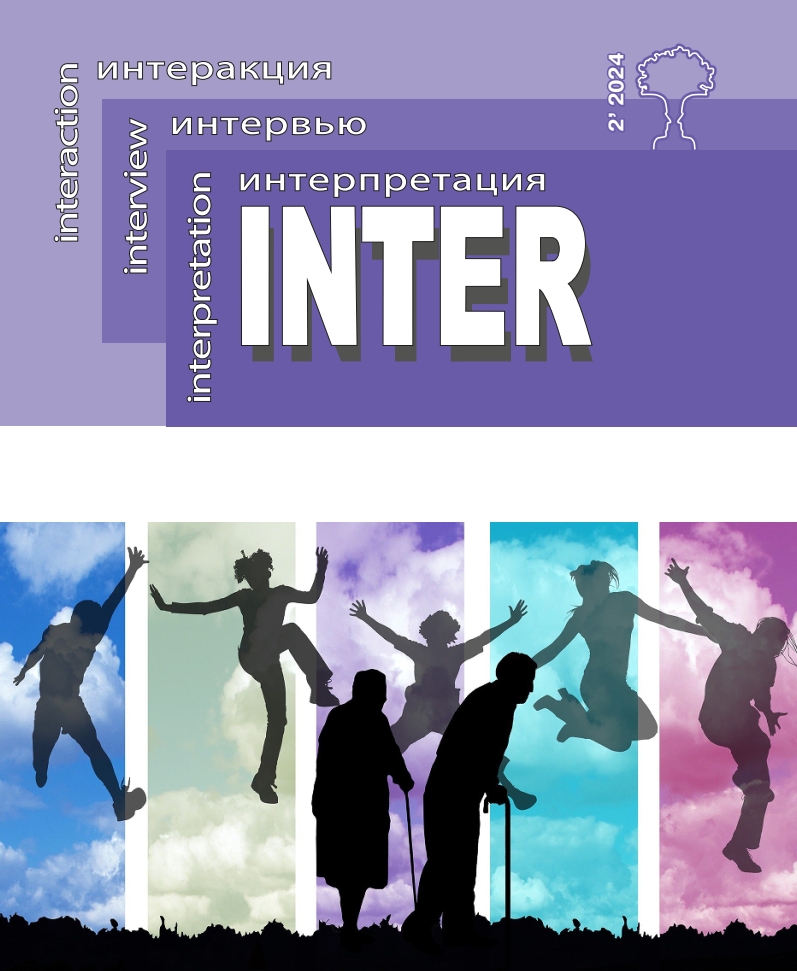 Интер №2 2024
Том 16 № 2 (2024)Поколение как понятие широко используется в научной литературе и публичном дискурсе для описания социальной динамики, но при этом до сих пор не приобрело четкого научного обозначения для адекватной эмпирической апробации. Хотя обычно это ретроспективное направление в социологии, однако оно обладает определенным оптимистической нагрузкой, к его использованию прибегают, когда состояние неопределенности и рисков в социальной реальности заставляет оглянуться назад, в прошлое, для поиска аналогов и попытаться заглянуть в будущее для поиска ответов на вопросы, связанные с тревогами и надеждами настоящего времени. Тогда и возрастает научный интерес к беби-бумерам или к молодежи 1968-го, к поколению 90-х или к миллениалам. Поэтому мы выбрали эту тематику центральной для статей настоящего номера. При всей многоаспектности и многотемности интереса к поколениям в статьях есть единая линия, отражающая тренд в современных подходах к поколениям. Основным трендом, является фокус не на межпоколенных изменениях, а на внутрипоколенных различиях; отход от понимания поколения как единой когорты с единым поколенческим сознанием («дух поколения»). Возможно, это связано с современными социальными процессами, когда скорость социальных изменений опережает «шаг» поколения, и тогда миропонимание отдельных фракций внутри генерации не успевает за сдвигами в социально-исторической перспективе. Различия внутри поколения перекрывают межпоколенные изменения. Эти процессы и размышления по-разному отражаются в статьях наших авторов — Елены Омельченко, Надежды Нартовой, Елизаветы Балацюк и Елизаветы Кресниковой, а также молодого автора Ольги Салангиной. Вторым направлением тематики номера стала наша традиционная рубрика исследовательской рефлексии при работе с маргинальными группами и их сенситивными проблемами. Евгения Кузинер рассматривает ее на примере работы в поле с такой труднодоступной группой как бездомные, а Элла Жесько и Леонид Петрухин — на примере работы с мигрантами и их изменяющейся идентичностью.
Интер №2 2024
Том 16 № 2 (2024)Поколение как понятие широко используется в научной литературе и публичном дискурсе для описания социальной динамики, но при этом до сих пор не приобрело четкого научного обозначения для адекватной эмпирической апробации. Хотя обычно это ретроспективное направление в социологии, однако оно обладает определенным оптимистической нагрузкой, к его использованию прибегают, когда состояние неопределенности и рисков в социальной реальности заставляет оглянуться назад, в прошлое, для поиска аналогов и попытаться заглянуть в будущее для поиска ответов на вопросы, связанные с тревогами и надеждами настоящего времени. Тогда и возрастает научный интерес к беби-бумерам или к молодежи 1968-го, к поколению 90-х или к миллениалам. Поэтому мы выбрали эту тематику центральной для статей настоящего номера. При всей многоаспектности и многотемности интереса к поколениям в статьях есть единая линия, отражающая тренд в современных подходах к поколениям. Основным трендом, является фокус не на межпоколенных изменениях, а на внутрипоколенных различиях; отход от понимания поколения как единой когорты с единым поколенческим сознанием («дух поколения»). Возможно, это связано с современными социальными процессами, когда скорость социальных изменений опережает «шаг» поколения, и тогда миропонимание отдельных фракций внутри генерации не успевает за сдвигами в социально-исторической перспективе. Различия внутри поколения перекрывают межпоколенные изменения. Эти процессы и размышления по-разному отражаются в статьях наших авторов — Елены Омельченко, Надежды Нартовой, Елизаветы Балацюк и Елизаветы Кресниковой, а также молодого автора Ольги Салангиной. Вторым направлением тематики номера стала наша традиционная рубрика исследовательской рефлексии при работе с маргинальными группами и их сенситивными проблемами. Евгения Кузинер рассматривает ее на примере работы в поле с такой труднодоступной группой как бездомные, а Элла Жесько и Леонид Петрухин — на примере работы с мигрантами и их изменяющейся идентичностью. -
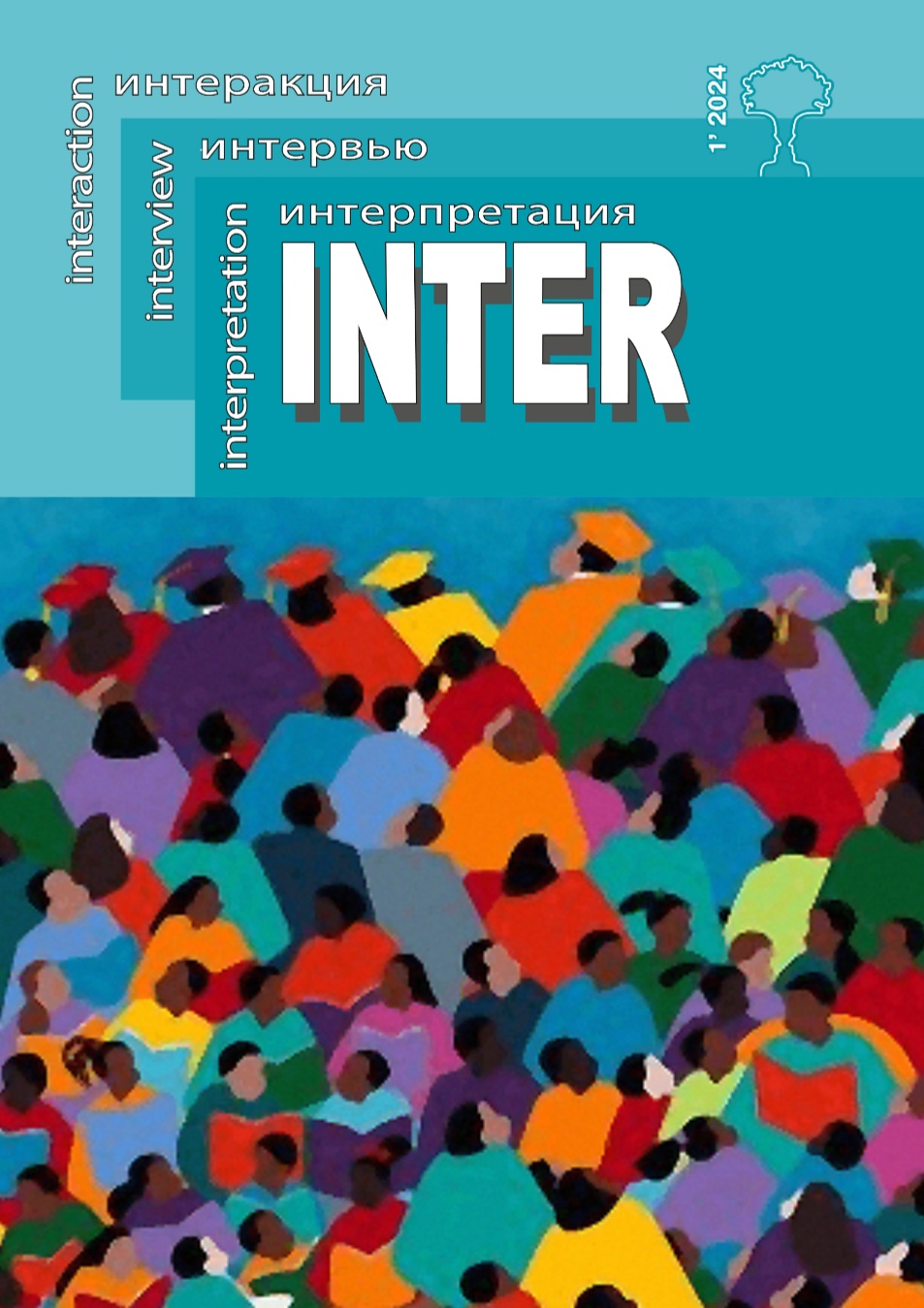 ИНТЕР №1 2024
Том 16 № 1 (2024)Первый номер журнала в 2024 году посвящен ряду актуальных проблем качественной социологии, которые символически перенимают эстафету. Это широкий круг исследовательских вопросов — от масштабнейшего вопрошания, зачем нужна социология, до заботы о здоровье среди малоресурсных женщин, от рынка арт-объектов, каким его видят художники, коллекционеры, арт-дилеры, галеристы, до проблем медсестер в эпоху пандемии, от стратегий национальной самопрезентации в сетях до проверки социальных технологий на эффективность. Тем не менее, при всем разнообразии исследуемых сюжетов, мы воспользуемся «наболевшими» вопросами эссе-размышления Питера Бергера, любезно переведенного, отреферированного и осмысленного Ольгой Симоновой и Алексеем Вайзером. Давняя и, оказывается, до сих пор не переведенная работа знаменитого социолога оставляет нам в наследство пострефлексию о задачах социологии, поставленных больших вопросах и пренебрежении ими, моральном императиве не забывать о них. Попытка опубликовать в текущем номере именно перевод с комментариями натолкнулась на сопротивление держателей прав, оправдываемое текущими обстоятельствами. Как нам кажется, эта примета времени, равно как и обращение автора к дилемме больших и малых вопросов в социологии, — символична. От больших вопросов о назначении и смысле дисциплины не уйти, их можно лишь отложить, но малыми вопросами всегда оправдано заняться.
ИНТЕР №1 2024
Том 16 № 1 (2024)Первый номер журнала в 2024 году посвящен ряду актуальных проблем качественной социологии, которые символически перенимают эстафету. Это широкий круг исследовательских вопросов — от масштабнейшего вопрошания, зачем нужна социология, до заботы о здоровье среди малоресурсных женщин, от рынка арт-объектов, каким его видят художники, коллекционеры, арт-дилеры, галеристы, до проблем медсестер в эпоху пандемии, от стратегий национальной самопрезентации в сетях до проверки социальных технологий на эффективность. Тем не менее, при всем разнообразии исследуемых сюжетов, мы воспользуемся «наболевшими» вопросами эссе-размышления Питера Бергера, любезно переведенного, отреферированного и осмысленного Ольгой Симоновой и Алексеем Вайзером. Давняя и, оказывается, до сих пор не переведенная работа знаменитого социолога оставляет нам в наследство пострефлексию о задачах социологии, поставленных больших вопросах и пренебрежении ими, моральном императиве не забывать о них. Попытка опубликовать в текущем номере именно перевод с комментариями натолкнулась на сопротивление держателей прав, оправдываемое текущими обстоятельствами. Как нам кажется, эта примета времени, равно как и обращение автора к дилемме больших и малых вопросов в социологии, — символична. От больших вопросов о назначении и смысле дисциплины не уйти, их можно лишь отложить, но малыми вопросами всегда оправдано заняться. -
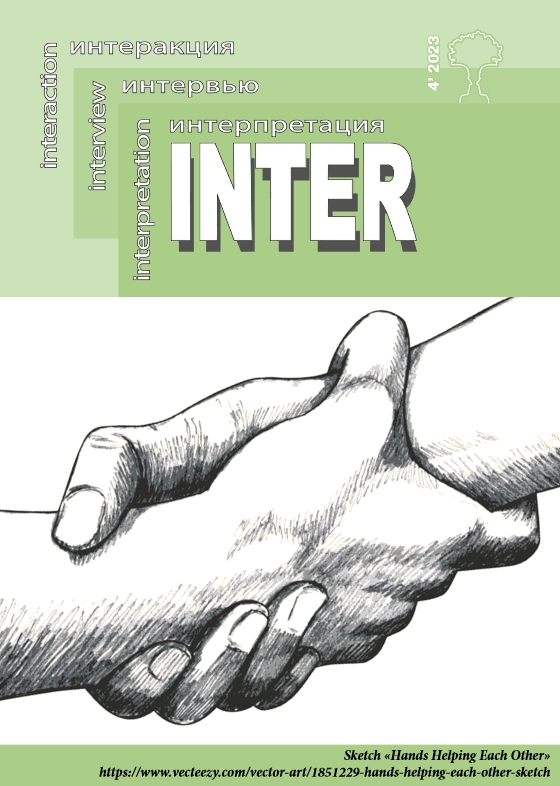 Интер №4 2023
Том 15 № 4 (2023)Последний в 2023 году номер «Интера» посвящен преимущественно двум большим темам, которые относятся к числу ключевых для нашего журнала: во-первых, методологической и методической рефлексии, во-вторых, исследо- ваниям солидарности в различных социальных средах. Обе темы чрезвычайно актуальны для современного общества: необходимость в солидаризации для защиты своих интересов, для осознания своей идентичности, для ответа на вопросы «кто я?» и «с кем я?» кажется насущной для каждого гражданина. А рефлексия по поводу методов, с помощью которых общество осознает само себя, их адекватности поставленным задачам, возможных искажений, и в то же время возможности дать голос исключенным группам становится особенно важной в моменты критических изменений.
Интер №4 2023
Том 15 № 4 (2023)Последний в 2023 году номер «Интера» посвящен преимущественно двум большим темам, которые относятся к числу ключевых для нашего журнала: во-первых, методологической и методической рефлексии, во-вторых, исследо- ваниям солидарности в различных социальных средах. Обе темы чрезвычайно актуальны для современного общества: необходимость в солидаризации для защиты своих интересов, для осознания своей идентичности, для ответа на вопросы «кто я?» и «с кем я?» кажется насущной для каждого гражданина. А рефлексия по поводу методов, с помощью которых общество осознает само себя, их адекватности поставленным задачам, возможных искажений, и в то же время возможности дать голос исключенным группам становится особенно важной в моменты критических изменений. -
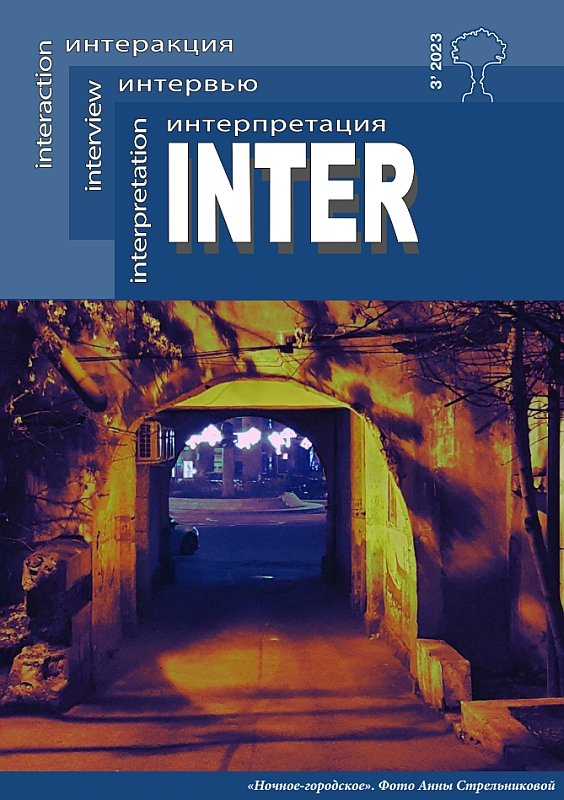 ИНТЕР №3 2023
Том 15 № 3 (2023)Примерно каждый четвертый номер журнала «Интеракция. Интервью. Интерпретация» посвящен городской тематике. И текущий сентябрьский номер — именно такой. На его страницах авторы рефлексируют о методах и о городе, немного полемизируя друг с другом или раскрывая разные аспекты одного и того же сюжета. При этом авторы номера — молодые исследователи, и тем интереснее наблюдать, как энтузиазм от полученного исследовательского опыта становится фундаментом для теоретических и методических озарений: о качественном сетевом анализе, об использовании исследовательских дневников вместо транскриптов интервью, об отношении горожан к микрочипам, об урбанистических дискурсах, о городских руинах и о коммерциализации городских пространств.
ИНТЕР №3 2023
Том 15 № 3 (2023)Примерно каждый четвертый номер журнала «Интеракция. Интервью. Интерпретация» посвящен городской тематике. И текущий сентябрьский номер — именно такой. На его страницах авторы рефлексируют о методах и о городе, немного полемизируя друг с другом или раскрывая разные аспекты одного и того же сюжета. При этом авторы номера — молодые исследователи, и тем интереснее наблюдать, как энтузиазм от полученного исследовательского опыта становится фундаментом для теоретических и методических озарений: о качественном сетевом анализе, об использовании исследовательских дневников вместо транскриптов интервью, об отношении горожан к микрочипам, об урбанистических дискурсах, о городских руинах и о коммерциализации городских пространств. -
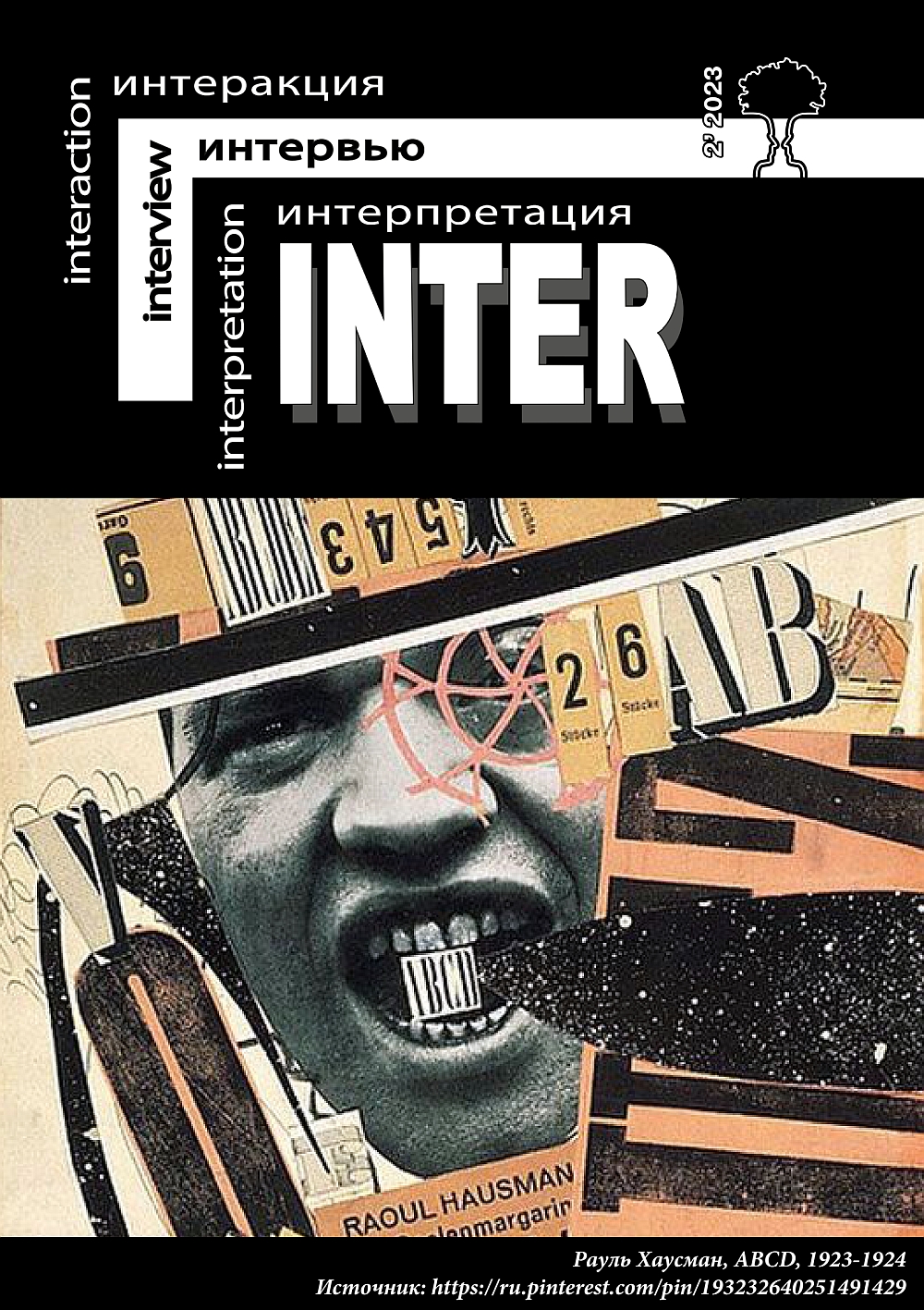 ИНТЕР №2 2023
Том 15 № 2 (2023)Этот номер посвящен обсуждению подходов, методов и этики исследования повседневности российского общества в турбулентный период. Авторы номера продолжают начатую ранее на страницах ИНТЕРа дискуссию о классических и инновационных практиках сбора, анализа и представления качественных данных в эпоху социальных изменений, осмысление эмоциональных и моральных аспектов жизненного опыта: о терапевтическом дискурсе и нормализации «не-действия» в ситуации кризиса (А. Жемчугова и И. Чудова), об этических дилеммах при изучении жизненного опыта беженцев из Украины социологом из России (О. Бредникова). Рубрика «Исследовательская рефлексия» представлена статьей об особенностях применения онлайн фокус-групп (М. Желизнык), а в "Полевых исследованиях" можно прочитать об особенностях дневника поездок как метода изучения транспортного поведения (М. Сергиенко). В жанре эссе представлена статья об экспериментально-художественных практиках в преподавании (М.Семина). Завершает номер рецензия Л. Петровой на два учебных пособия: «Как собрать данные в полевом качественном исследовании» и «Практики анализа качественных данных в социальных науках».
ИНТЕР №2 2023
Том 15 № 2 (2023)Этот номер посвящен обсуждению подходов, методов и этики исследования повседневности российского общества в турбулентный период. Авторы номера продолжают начатую ранее на страницах ИНТЕРа дискуссию о классических и инновационных практиках сбора, анализа и представления качественных данных в эпоху социальных изменений, осмысление эмоциональных и моральных аспектов жизненного опыта: о терапевтическом дискурсе и нормализации «не-действия» в ситуации кризиса (А. Жемчугова и И. Чудова), об этических дилеммах при изучении жизненного опыта беженцев из Украины социологом из России (О. Бредникова). Рубрика «Исследовательская рефлексия» представлена статьей об особенностях применения онлайн фокус-групп (М. Желизнык), а в "Полевых исследованиях" можно прочитать об особенностях дневника поездок как метода изучения транспортного поведения (М. Сергиенко). В жанре эссе представлена статья об экспериментально-художественных практиках в преподавании (М.Семина). Завершает номер рецензия Л. Петровой на два учебных пособия: «Как собрать данные в полевом качественном исследовании» и «Практики анализа качественных данных в социальных науках». -
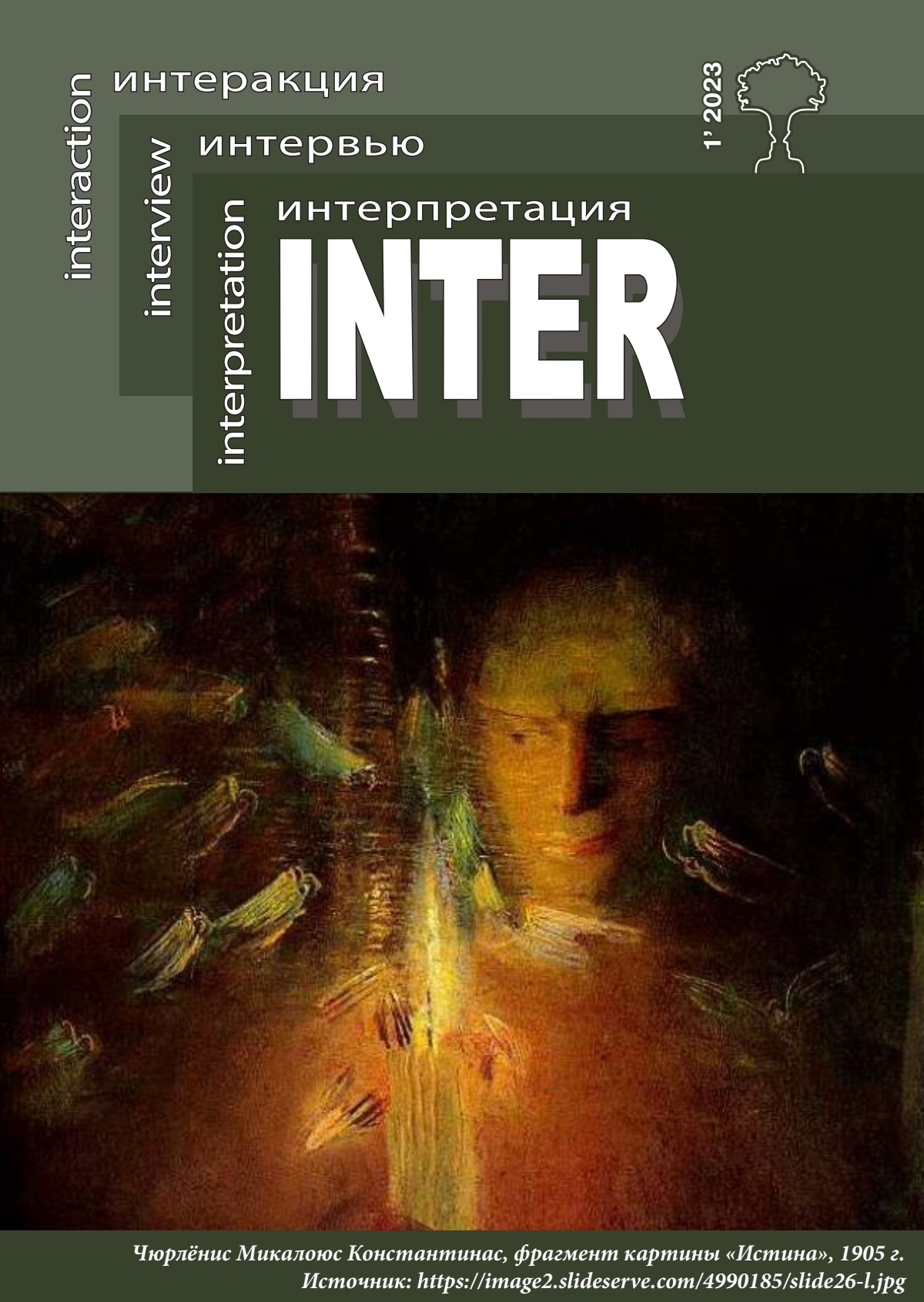 ИНТЕР №1 2023
Том 15 № 1 (2023)Новый номер сфокусировался на культурологическом осмыслении современного момента. Даже полевые исследования в нем обращены больше не к повседневной реальности, которая обычно в наших номерах является центральной темой, а к проблемам культурного осмысления более общих социальных процессов: к проблематике истории, литературы, к памяти. С ХIX века в российской интеллектуальной жизни такое состояние в последовательном чередовании разного эмоционального восприятия на континууме социального времени принято обозначать в образах: как времена рефлексирующего о сути бытия Гамлета, в роли которого выступают на этих страницах авторы нашего номера, и как времена деятельного Дон-Кихота, ищущего новые сферы для приложения своей активности (И. Тургенев). В открывающей номер статье Елизаветы Волковой и Дарьи Хлевнюк речь идет о восприятии нашего совсем недавнего прошлого — противоречивого времени «девяностых» — и его разноплановых интерпретациях. Работа Александра Рязанцева обращает нас к анализу писательства как социальной группы с особым социальным статусом. Несомненно, читательский интерес вызовет рецензия Александра Малинкина на нашумевшую книгу Леонида Ионина «Драма жизни Макса Вебера».Фактически это заявка на особый жанр документально-исторического романа, о чем и рассуждает на страницах журнала рецензент. Рефлексивность как центральная тема, теперь уже социологически-методологической направленности, продолжена статьей Сергея Белановского «Репрезентативность качественных опросов». Тема методологической рефлексии продолжена и в статье Максима Котельникова «Механизмы формирования начального диалога в анонимной онлайн-коммуникации», а также в нашей традиционной рубрике «ИНТЕР-энциклопедия качественных методов», где Ольга Савинская рассуждает об особенностях интервьюирования детей.
ИНТЕР №1 2023
Том 15 № 1 (2023)Новый номер сфокусировался на культурологическом осмыслении современного момента. Даже полевые исследования в нем обращены больше не к повседневной реальности, которая обычно в наших номерах является центральной темой, а к проблемам культурного осмысления более общих социальных процессов: к проблематике истории, литературы, к памяти. С ХIX века в российской интеллектуальной жизни такое состояние в последовательном чередовании разного эмоционального восприятия на континууме социального времени принято обозначать в образах: как времена рефлексирующего о сути бытия Гамлета, в роли которого выступают на этих страницах авторы нашего номера, и как времена деятельного Дон-Кихота, ищущего новые сферы для приложения своей активности (И. Тургенев). В открывающей номер статье Елизаветы Волковой и Дарьи Хлевнюк речь идет о восприятии нашего совсем недавнего прошлого — противоречивого времени «девяностых» — и его разноплановых интерпретациях. Работа Александра Рязанцева обращает нас к анализу писательства как социальной группы с особым социальным статусом. Несомненно, читательский интерес вызовет рецензия Александра Малинкина на нашумевшую книгу Леонида Ионина «Драма жизни Макса Вебера».Фактически это заявка на особый жанр документально-исторического романа, о чем и рассуждает на страницах журнала рецензент. Рефлексивность как центральная тема, теперь уже социологически-методологической направленности, продолжена статьей Сергея Белановского «Репрезентативность качественных опросов». Тема методологической рефлексии продолжена и в статье Максима Котельникова «Механизмы формирования начального диалога в анонимной онлайн-коммуникации», а также в нашей традиционной рубрике «ИНТЕР-энциклопедия качественных методов», где Ольга Савинская рассуждает об особенностях интервьюирования детей. -
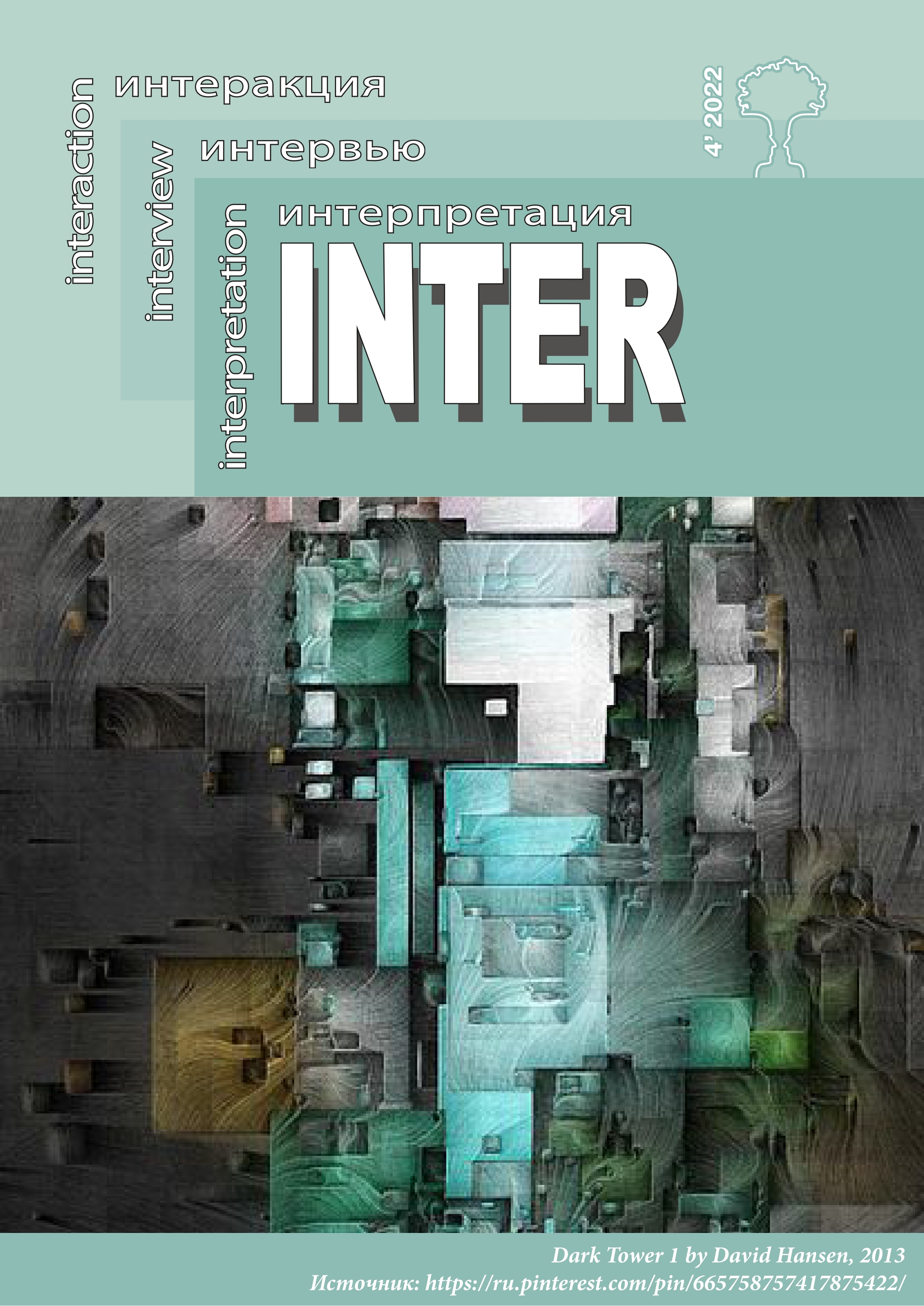 ИНТЕР №4 2022
Том 14 № 4 (2022)Представляя новый номер ИНТЕРа, заключительный для непростого 2022 года, мы ищем сквозной лейтмотив для публикуемых статей. И хотя специально мы не анонсировали общую тему, тем не менее улавливается общее настроение, выраженное сильнее или слабее. Нам кажется, что речь идет о травме как «плавающем означающем» с ее нестрогими границами и трудно вербализируемым содержанием, которое тем не менее оставляет след и меняет формы предъявления. Само понятие травмы многое доносит нам о времени, которое мы проживаем, событиях, нас травмирующих, о важных для нас ценностях, поставленных под сомнение обстоятельствами, и о тех способах, которыми мы пытаемся с травмой совладать. Тренд исследования травмы (культурной, исторической, социальной, трансформационной и других) — в сдвиге от некоего события в структуре опыта, сопротивляющегося презентации, до переоткрытия травмы, подлежащей рассказыванию и трансмедийной визуализации всеми возможными способами.
ИНТЕР №4 2022
Том 14 № 4 (2022)Представляя новый номер ИНТЕРа, заключительный для непростого 2022 года, мы ищем сквозной лейтмотив для публикуемых статей. И хотя специально мы не анонсировали общую тему, тем не менее улавливается общее настроение, выраженное сильнее или слабее. Нам кажется, что речь идет о травме как «плавающем означающем» с ее нестрогими границами и трудно вербализируемым содержанием, которое тем не менее оставляет след и меняет формы предъявления. Само понятие травмы многое доносит нам о времени, которое мы проживаем, событиях, нас травмирующих, о важных для нас ценностях, поставленных под сомнение обстоятельствами, и о тех способах, которыми мы пытаемся с травмой совладать. Тренд исследования травмы (культурной, исторической, социальной, трансформационной и других) — в сдвиге от некоего события в структуре опыта, сопротивляющегося презентации, до переоткрытия травмы, подлежащей рассказыванию и трансмедийной визуализации всеми возможными способами. -
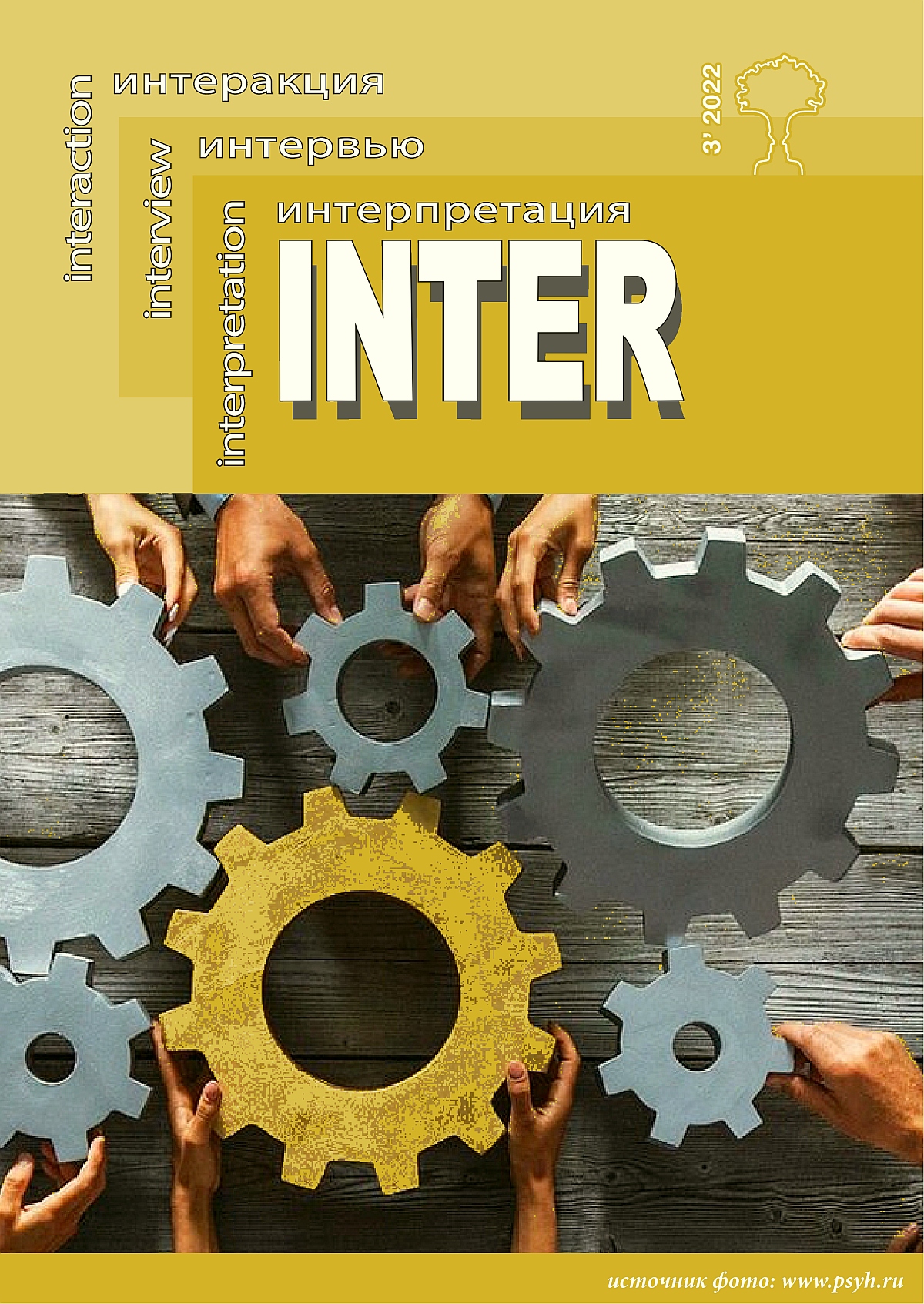 ИНТЕР №3 2022
Том 14 № 3 (2022)Не секрет, что российский рынок труда переживает сложные времена, хотя можно спорить о том, находится ли он уже в состоянии кризиса или пока что балансирует на его краю. Цена новых экономических и социальных вызовов уже достаточно высока, и платить ее придется прежде всего рядовым работникам, социальные гарантии которых на глазах съеживаются, как шагреневая кожа. И помимо того, что эти процессы важно фиксировать социологически, их драматизм часто предполагает, что ученые, в них вовлеченные, занимают по отношению к ним еще и гражданскую позицию, опираясь на традиции публичной социологии. Это характерно и для авторов нашего номера, которые погружены в свои исследования очень глубоко — буквально вплоть до включенного наблюдения, предполагающего, что исследователь не просто максимально близко приближается к своему объекту, но и разделяет с ним его повседневные проблемы, практики и тяготы. Это и мониторинг трудовых протестов П.Бизюкова, и исследование «платформенного» капитализма при помощи этнографического подхода (А.Старовойтенко, Р.Абрамов, О.Пинчук), и вторичный анализ феномена «партизанщины» (О.Пинчук), и материалы других авторов номера. Также «Интер» продолжает свой ключевой проект — публикацию «Энциклопедии качественных методов». В новом номере можно познакомиться с содержательной обзорной статьей, посвященной конверсационному анализу, — надеемся, что она будет полезной для всех социологов, исследующих повседневность и любые диалоговые жанры коммуникации.
ИНТЕР №3 2022
Том 14 № 3 (2022)Не секрет, что российский рынок труда переживает сложные времена, хотя можно спорить о том, находится ли он уже в состоянии кризиса или пока что балансирует на его краю. Цена новых экономических и социальных вызовов уже достаточно высока, и платить ее придется прежде всего рядовым работникам, социальные гарантии которых на глазах съеживаются, как шагреневая кожа. И помимо того, что эти процессы важно фиксировать социологически, их драматизм часто предполагает, что ученые, в них вовлеченные, занимают по отношению к ним еще и гражданскую позицию, опираясь на традиции публичной социологии. Это характерно и для авторов нашего номера, которые погружены в свои исследования очень глубоко — буквально вплоть до включенного наблюдения, предполагающего, что исследователь не просто максимально близко приближается к своему объекту, но и разделяет с ним его повседневные проблемы, практики и тяготы. Это и мониторинг трудовых протестов П.Бизюкова, и исследование «платформенного» капитализма при помощи этнографического подхода (А.Старовойтенко, Р.Абрамов, О.Пинчук), и вторичный анализ феномена «партизанщины» (О.Пинчук), и материалы других авторов номера. Также «Интер» продолжает свой ключевой проект — публикацию «Энциклопедии качественных методов». В новом номере можно познакомиться с содержательной обзорной статьей, посвященной конверсационному анализу, — надеемся, что она будет полезной для всех социологов, исследующих повседневность и любые диалоговые жанры коммуникации. -
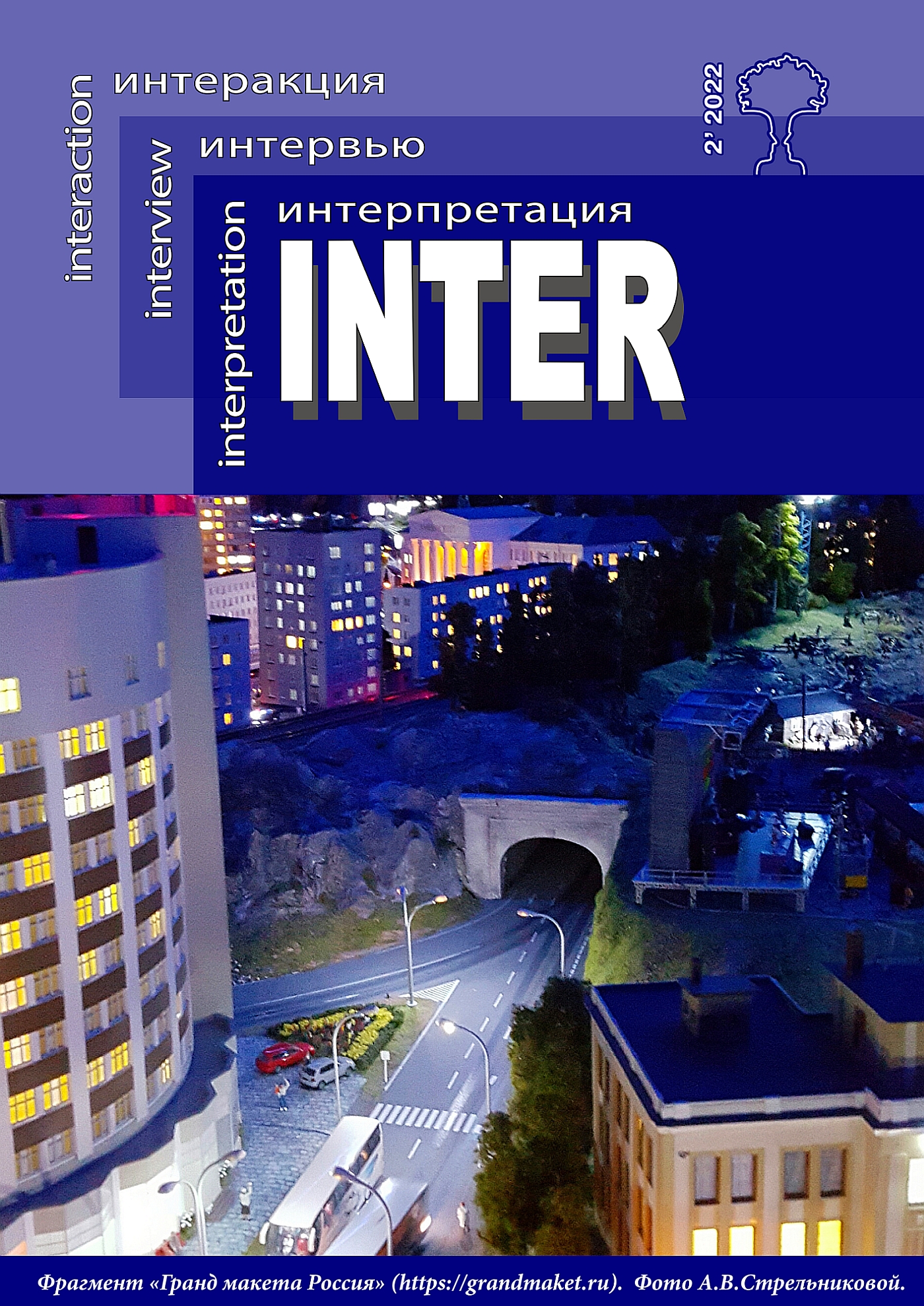 ИНТЕР №2 2022
Том 14 № 2 (2022)Фотография фрагмента интерактивного макета из музея «Гранд Макет Россия» (https://grandmaket.ru), размещенная на обложке номера, иллюстрирует многофокусность, динамику и мозаичность городской жизни. Мозаика сюжетов городской повседневности стала основой текущего номера журнала «Интеракция. Интервью. Интерпретация». Авторы номера приглашают к дискуссии о навигации по городской гастрономии, о транспортных привычках, о городской безопасности, о формировании креативных кластеров, о городской экологической повестке. Открывает дискуссию теоретический обзор Тамары Щегловой, которая концептуализирует понятие чувства безопасности как социально-эмоциональной характеристики городского пространства, акцентируясь на различиях между понятиями городской безопасности и ощущением безопасности в городе. Далее в рамках полевых исследований обсуждаются экологические риски городской жизни (Дарья Лебедева), возможности перепрофилирования бывших промышленных территорий в городские креативные кластеры (Елена Рассолова и Константин Галкин). В обеих статьях делается попытка выявления разных стратегий горожан, отражающих гетерогенность мнений и стилей жизни, присущих городу. Транспортная система является неотъемлемой частью городской жизни. Олег Янишевский исследует недавний кейс с изменением привычных маршрутов и переименованием номеров общественного транспорта в Москве. Анализ комментариев в районных онлайн-группах показывает не только критический настрой горожан по поводу данной ситуации, но вскрывает и более тонкие элементы механики городской жизни. В рубрике «Исследовательская рефлексия» предлагаются два текста. Элла Жесько анализирует интервью с гастрожурналистом о вкусах, местах и профессионализме и делает выводы о том, от чего зависят гастрономические практики горожан. Также автор показывает, как отдельный кейс может послужить основой для выстраивания исследовательской концептуализации. Вторая статья рубрики описывает рефлексию автора (Миляуши Гибадуллиной) об амбивалентности позиции исследователя и о специфике полевой работы при выборе «сложного» объекта: религиозности учащихся и преподавателей мусульманских учебных заведений Татарстана.
ИНТЕР №2 2022
Том 14 № 2 (2022)Фотография фрагмента интерактивного макета из музея «Гранд Макет Россия» (https://grandmaket.ru), размещенная на обложке номера, иллюстрирует многофокусность, динамику и мозаичность городской жизни. Мозаика сюжетов городской повседневности стала основой текущего номера журнала «Интеракция. Интервью. Интерпретация». Авторы номера приглашают к дискуссии о навигации по городской гастрономии, о транспортных привычках, о городской безопасности, о формировании креативных кластеров, о городской экологической повестке. Открывает дискуссию теоретический обзор Тамары Щегловой, которая концептуализирует понятие чувства безопасности как социально-эмоциональной характеристики городского пространства, акцентируясь на различиях между понятиями городской безопасности и ощущением безопасности в городе. Далее в рамках полевых исследований обсуждаются экологические риски городской жизни (Дарья Лебедева), возможности перепрофилирования бывших промышленных территорий в городские креативные кластеры (Елена Рассолова и Константин Галкин). В обеих статьях делается попытка выявления разных стратегий горожан, отражающих гетерогенность мнений и стилей жизни, присущих городу. Транспортная система является неотъемлемой частью городской жизни. Олег Янишевский исследует недавний кейс с изменением привычных маршрутов и переименованием номеров общественного транспорта в Москве. Анализ комментариев в районных онлайн-группах показывает не только критический настрой горожан по поводу данной ситуации, но вскрывает и более тонкие элементы механики городской жизни. В рубрике «Исследовательская рефлексия» предлагаются два текста. Элла Жесько анализирует интервью с гастрожурналистом о вкусах, местах и профессионализме и делает выводы о том, от чего зависят гастрономические практики горожан. Также автор показывает, как отдельный кейс может послужить основой для выстраивания исследовательской концептуализации. Вторая статья рубрики описывает рефлексию автора (Миляуши Гибадуллиной) об амбивалентности позиции исследователя и о специфике полевой работы при выборе «сложного» объекта: религиозности учащихся и преподавателей мусульманских учебных заведений Татарстана. -
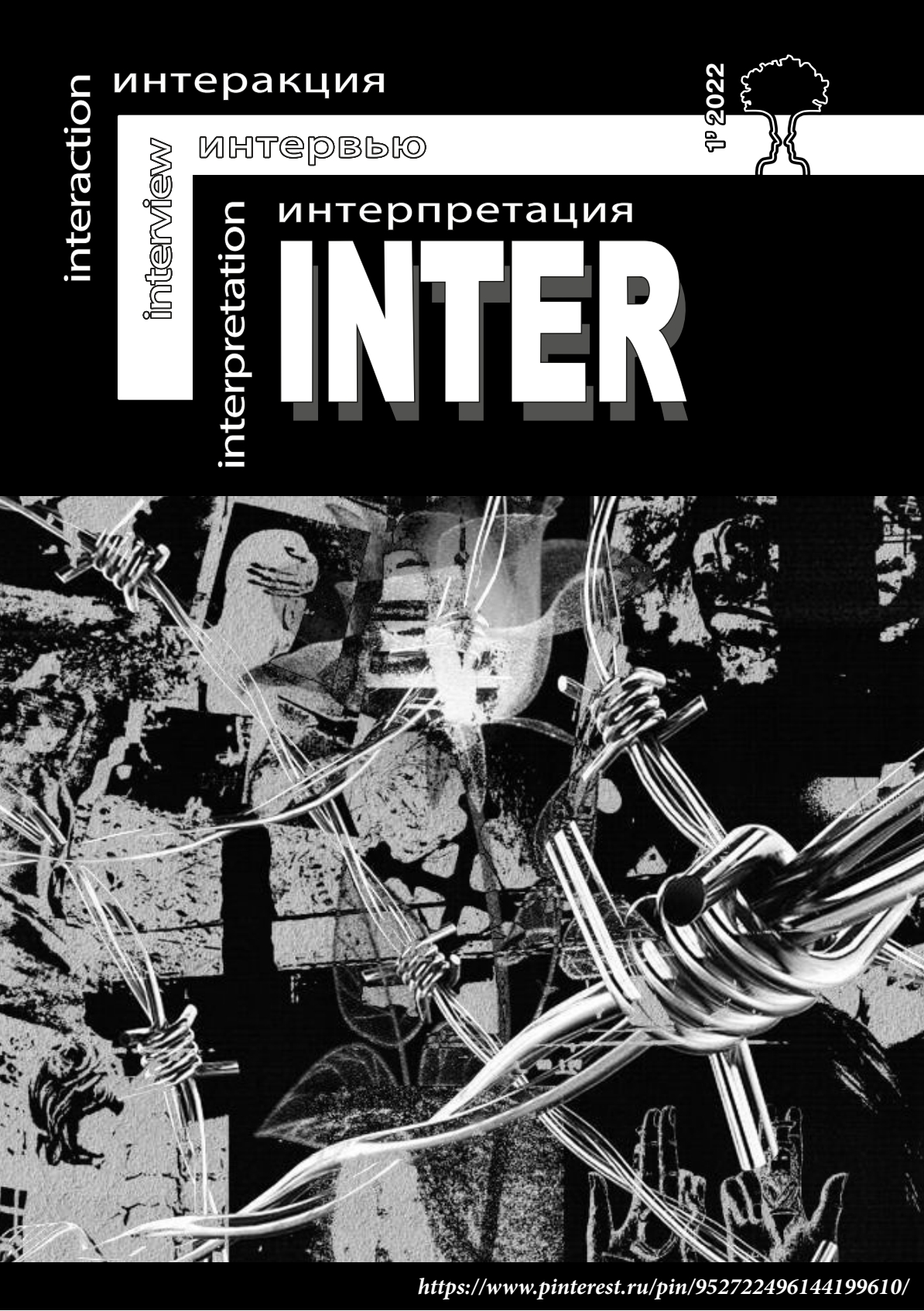 ИНТЕР №1 2022
Том 14 № 1 (2022)Время порой движется такими убыстренными темпами, засасывая нас в воронку тектонических изменений, что мы, исследователи, не успеваем переосмыслить подобные сдвиги, но в то же время уже по-иному начинаем смотреть на процессы обычной повседневной нормальности. Возможно, в свете последних событий некоторые сюжеты размышлений на страницах этого номера кажутся уже не столь важными, но они составляли и составляют ткань повседневной научной жизни. Профессиональный долг заставляет нас прежде всего в любых обстоятельствах думать о своем деле, о профессии. И в этом плане поднятая в номере дискуссия о настоящем и будущем качественной методологии представляется весьма ценной: речь идет не только о научной истине и миссии науки, объективности субъективной социологии, научном обосновании и критериях качества исследований (Елена Ярская-Смирнова); об этических принципах научного проекта (Елена Здравомыслова), но также и о взаимодействии науки с социальным миром, о сложностях полевого производства социального знания: о языке исследовательской коммуникации и дискурсивных напряжениях в условиях сложного маргинального поля (Елена Омельченко), об угрозах секьюритизации и рисках стигматизации полевых исследователей, о профанации биографического подхода в результате медийной эксплуатации гламурной биографии (Елена Здравомыслова), а также о том, к чему готовить новые поколения исследователей (Илья Штейнберг). Помимо коллективной рефлексии относительно настоящего и будущего качественной парадигмы (ради чего, собственно, и создавался наш журнал), методологическая составляющая представлена также постоянной рубрикой «Интер-энциклопедия», в которой размещена статья Александры Ваньке о многофокусной этнографии. Рубрика полевых исследований на этот раз обращена к различным мирам повседневного существования современного человека в ситуации нормализованного социального порядка. Это, прежде всего, такие пространства, как социальные сети (Ольга Логунова / Полина Завгородняя), здравоохранительное поведение и сфера заботы о здоровье (Оксана Михайлова, Елена Бердышева), «индустрия производства красоты» (Эльвира Ариф / Арина Ревякина). Центральный локус подобного изучения — индивидуализированный мир социальных субъектов, где авторы обращаются к теме социального лидерства или продвинутых акторов в различных сферах социальной жизни.
ИНТЕР №1 2022
Том 14 № 1 (2022)Время порой движется такими убыстренными темпами, засасывая нас в воронку тектонических изменений, что мы, исследователи, не успеваем переосмыслить подобные сдвиги, но в то же время уже по-иному начинаем смотреть на процессы обычной повседневной нормальности. Возможно, в свете последних событий некоторые сюжеты размышлений на страницах этого номера кажутся уже не столь важными, но они составляли и составляют ткань повседневной научной жизни. Профессиональный долг заставляет нас прежде всего в любых обстоятельствах думать о своем деле, о профессии. И в этом плане поднятая в номере дискуссия о настоящем и будущем качественной методологии представляется весьма ценной: речь идет не только о научной истине и миссии науки, объективности субъективной социологии, научном обосновании и критериях качества исследований (Елена Ярская-Смирнова); об этических принципах научного проекта (Елена Здравомыслова), но также и о взаимодействии науки с социальным миром, о сложностях полевого производства социального знания: о языке исследовательской коммуникации и дискурсивных напряжениях в условиях сложного маргинального поля (Елена Омельченко), об угрозах секьюритизации и рисках стигматизации полевых исследователей, о профанации биографического подхода в результате медийной эксплуатации гламурной биографии (Елена Здравомыслова), а также о том, к чему готовить новые поколения исследователей (Илья Штейнберг). Помимо коллективной рефлексии относительно настоящего и будущего качественной парадигмы (ради чего, собственно, и создавался наш журнал), методологическая составляющая представлена также постоянной рубрикой «Интер-энциклопедия», в которой размещена статья Александры Ваньке о многофокусной этнографии. Рубрика полевых исследований на этот раз обращена к различным мирам повседневного существования современного человека в ситуации нормализованного социального порядка. Это, прежде всего, такие пространства, как социальные сети (Ольга Логунова / Полина Завгородняя), здравоохранительное поведение и сфера заботы о здоровье (Оксана Михайлова, Елена Бердышева), «индустрия производства красоты» (Эльвира Ариф / Арина Ревякина). Центральный локус подобного изучения — индивидуализированный мир социальных субъектов, где авторы обращаются к теме социального лидерства или продвинутых акторов в различных сферах социальной жизни. -
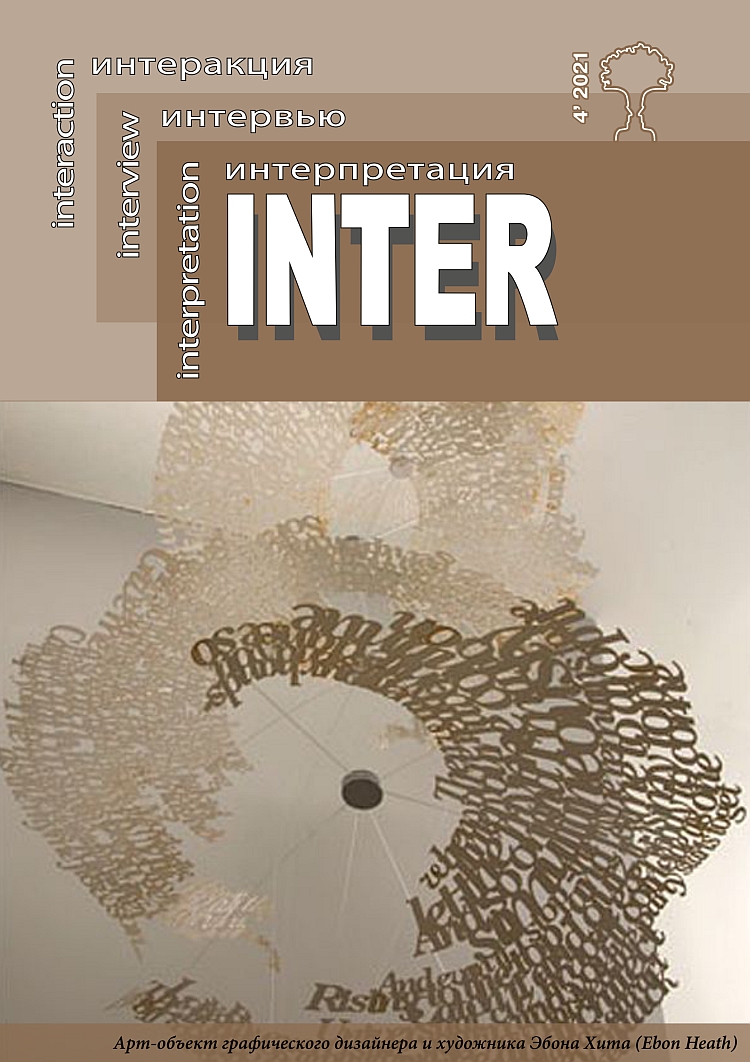 ИНТЕР №4 (2021)
Том 13 № 4 (2021)В номере представлены несколько актуальных смысловых осей. Прежде всего, это методологические размышления о том, как интервьюировать в эпоху пандемии и как осмыслить инструмент интервью с точки зрения задач исследователями и понимания вопросов информантами. Речь о переводной статье Бэкки Сэлф «Проведение интервью во время и после пандемии COVID-19» (перевод Александра Рязанцева) и статье «Когнитивное интервью» — вкладе Ивана Климова в ИНТЕР-энциклопедию качественных методов. Другая смысловая ось, вполне ожидаемая в эпоху гендерного блоу-ап, — это статья на тему женского карьерного роста «Образовательно-профессиональные траектории женщин-руководителей» Юлии Честных и исследование Анны Сокол о «Дискурсе первой романтической любви: гендерные сценарии». И, наконец, третья смысловая ось представлена общим сюжетом коммеморации. Причем форматы этой коммеморации отражают поиски современных поколений, стремящихся к использованию новых цифровых платформ для разговора о социальной памяти силами инфлюенсеров либо к строительству нового языка для выражения отношения к теме памятования. В первом случае речь о статье «Родины нашего страха: рецепция фильма Юрия Дудя “Колыма” в социальных сетях» Дарьи Хлевнюк и Алисы Максимовой. Во втором случае в рубрике «Визуальная социология» представлена групповая аналитическая дискуссия вокруг нового объекта коммеморации — «Кристальной стены плача» известной сербской художницы и перформансистки Марины Абрамович. Мы организовали эту дискуссию, намеренно не знакомя ее участников — Сергея Старцева, Андреа Пето, Наталию Веселкову, Романа Абрамову, Оксану Запорожец — с текстами друг друга, стремясь к эффекту интертекстуальности уже на страницах журнала.
ИНТЕР №4 (2021)
Том 13 № 4 (2021)В номере представлены несколько актуальных смысловых осей. Прежде всего, это методологические размышления о том, как интервьюировать в эпоху пандемии и как осмыслить инструмент интервью с точки зрения задач исследователями и понимания вопросов информантами. Речь о переводной статье Бэкки Сэлф «Проведение интервью во время и после пандемии COVID-19» (перевод Александра Рязанцева) и статье «Когнитивное интервью» — вкладе Ивана Климова в ИНТЕР-энциклопедию качественных методов. Другая смысловая ось, вполне ожидаемая в эпоху гендерного блоу-ап, — это статья на тему женского карьерного роста «Образовательно-профессиональные траектории женщин-руководителей» Юлии Честных и исследование Анны Сокол о «Дискурсе первой романтической любви: гендерные сценарии». И, наконец, третья смысловая ось представлена общим сюжетом коммеморации. Причем форматы этой коммеморации отражают поиски современных поколений, стремящихся к использованию новых цифровых платформ для разговора о социальной памяти силами инфлюенсеров либо к строительству нового языка для выражения отношения к теме памятования. В первом случае речь о статье «Родины нашего страха: рецепция фильма Юрия Дудя “Колыма” в социальных сетях» Дарьи Хлевнюк и Алисы Максимовой. Во втором случае в рубрике «Визуальная социология» представлена групповая аналитическая дискуссия вокруг нового объекта коммеморации — «Кристальной стены плача» известной сербской художницы и перформансистки Марины Абрамович. Мы организовали эту дискуссию, намеренно не знакомя ее участников — Сергея Старцева, Андреа Пето, Наталию Веселкову, Романа Абрамову, Оксану Запорожец — с текстами друг друга, стремясь к эффекту интертекстуальности уже на страницах журнала. -
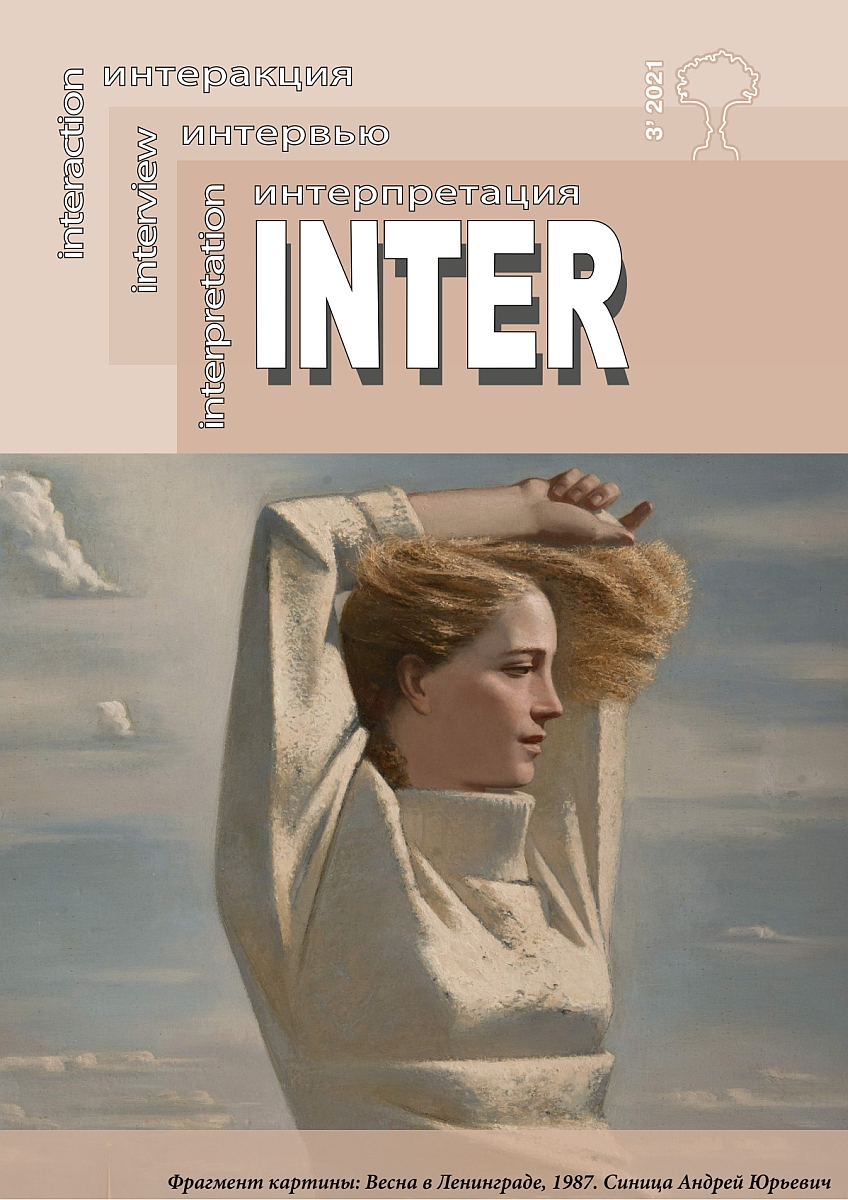 ИНТЕР №3 (2021)
Том 13 № 3 (2021)Значительную часть осеннего номера составляет тематическая подборка статей, посвященная гендерным аспектам института гражданства — прежде всего, женского. Над этой подборкой работали приглашенные нами редакторы — Жанна Чернова (ведущий научный сотрудник Санкт-Петербургского филиала Социологического института ФНИСЦ РАН и профессор факультета свободных искусств и наук СПбГУ) и Лариса Шпаковская (старший научный сотрудник Санкт-Петербургского филиала Социологического института ФНИСЦ РАН). Они представляют этот раздел журнала в небольшом вводном тексте и, помимо этого, являются авторами одной из его ключевых статей. В данном разделе обсуждаются особенности субъективного измерения гражданства, в том числе в контекте возраста, переосмысливается опыт борьбы за гражданские права. Кроме того, в номере представлена статья об особенностях коммуникации современных подростков и описываются те тонкие грани, за которыми обычное дружеское общение превращается в буллинг и унижение, а «просто шутки» перестают быть таковыми и становятся средством выстраивания иерархий. Замыкающий журнал текст — «Биография номера» — посвящен непростой теме повседневного, опривыченного потребления алкоголя. Героиней его является девушка, открыто и достаточно рефлексивно обсуждающая с интервьюером роль алкоголя в своей жизни. Эта статья содержит в себе не только изящный теоретический анализ текста биографического интервью, но и очень важные методологические рефлексии о том, как можно обсуждать с информантами сенситивные темы, насколько влияет на взаимопонимание с интервьюером уровень личного знакомства и разделенного опыта и, наконец, как воздействуют на анализ материала наши собственные нормативные представления и наша социальная позиция.
ИНТЕР №3 (2021)
Том 13 № 3 (2021)Значительную часть осеннего номера составляет тематическая подборка статей, посвященная гендерным аспектам института гражданства — прежде всего, женского. Над этой подборкой работали приглашенные нами редакторы — Жанна Чернова (ведущий научный сотрудник Санкт-Петербургского филиала Социологического института ФНИСЦ РАН и профессор факультета свободных искусств и наук СПбГУ) и Лариса Шпаковская (старший научный сотрудник Санкт-Петербургского филиала Социологического института ФНИСЦ РАН). Они представляют этот раздел журнала в небольшом вводном тексте и, помимо этого, являются авторами одной из его ключевых статей. В данном разделе обсуждаются особенности субъективного измерения гражданства, в том числе в контекте возраста, переосмысливается опыт борьбы за гражданские права. Кроме того, в номере представлена статья об особенностях коммуникации современных подростков и описываются те тонкие грани, за которыми обычное дружеское общение превращается в буллинг и унижение, а «просто шутки» перестают быть таковыми и становятся средством выстраивания иерархий. Замыкающий журнал текст — «Биография номера» — посвящен непростой теме повседневного, опривыченного потребления алкоголя. Героиней его является девушка, открыто и достаточно рефлексивно обсуждающая с интервьюером роль алкоголя в своей жизни. Эта статья содержит в себе не только изящный теоретический анализ текста биографического интервью, но и очень важные методологические рефлексии о том, как можно обсуждать с информантами сенситивные темы, насколько влияет на взаимопонимание с интервьюером уровень личного знакомства и разделенного опыта и, наконец, как воздействуют на анализ материала наши собственные нормативные представления и наша социальная позиция. -
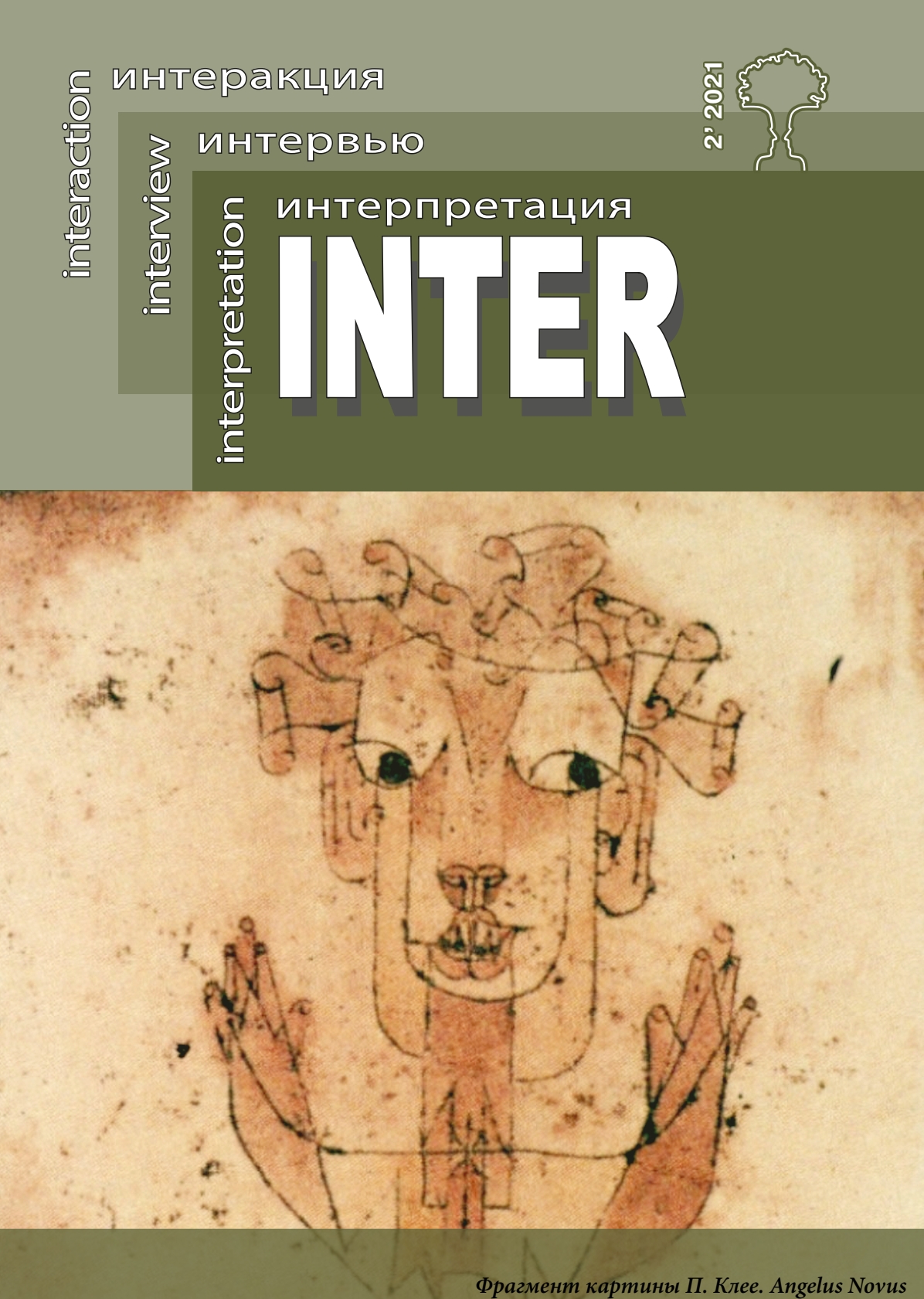 ИНТЕР №2 (2021)
Том 13 № 2 (2021)Статьи летнего номера журнала «Интеракция. Интервью. Интерпретация» объединяет, пожалуй, идея «дополнительного вклада» - теоретического, методического или эмпирического - для переосмысления и более глубокого анализа выбранной темы. Читателей ждет текст о потенциале сенсорной этнографии в качественных исследованиях (П. Ваневская), где автор анализирует теоретические истоки сенсорного поворота в социогуманитарном знании и рассуждает о дополнительном включении сенсорных аспектов повседневности в исследовательские дизайны. В рубрике «ИНТЕР-энциклопедия» размещено описание метода биографической прогулки, которая представляется не просто взаимодополнением интервью и наблюдения, но скорее переопределением формата работы с воспоминаниями или восприятием повседневности, где, конечно, тоже есть место для обогащения анализа данных сенсорными аспектами. В новой рубрике «Смыслы мест и места смыслов» встретились два текста о пространстве и его восприятии. В интеллектуальном эссе А. Старовойтенко предлагается дополнить и уточнить понимание и измерение ностальгии через привязку к пространственно-территориальным аспектам воспоминаний, то есть рассматривать место-ориентированную ностальгию в противовес время-ориентированной. А К. Галкин на материалах эмпирического исследования анализирует смыслы городского пространства в период пандемии. В разделе исследовательской рефлексии представлена работа М. Александровой о том, можно ли «сугубо количественный» интеллектуальный анализ текстовых данных применить в качественном исследовании. Также в номере предлагается статья по результатам эмпирического исследования, посвященного многоаспектной роли родителей на пути к освоению детьми цифровых компетенций (И. Писаренко, Л. Заиченко).
ИНТЕР №2 (2021)
Том 13 № 2 (2021)Статьи летнего номера журнала «Интеракция. Интервью. Интерпретация» объединяет, пожалуй, идея «дополнительного вклада» - теоретического, методического или эмпирического - для переосмысления и более глубокого анализа выбранной темы. Читателей ждет текст о потенциале сенсорной этнографии в качественных исследованиях (П. Ваневская), где автор анализирует теоретические истоки сенсорного поворота в социогуманитарном знании и рассуждает о дополнительном включении сенсорных аспектов повседневности в исследовательские дизайны. В рубрике «ИНТЕР-энциклопедия» размещено описание метода биографической прогулки, которая представляется не просто взаимодополнением интервью и наблюдения, но скорее переопределением формата работы с воспоминаниями или восприятием повседневности, где, конечно, тоже есть место для обогащения анализа данных сенсорными аспектами. В новой рубрике «Смыслы мест и места смыслов» встретились два текста о пространстве и его восприятии. В интеллектуальном эссе А. Старовойтенко предлагается дополнить и уточнить понимание и измерение ностальгии через привязку к пространственно-территориальным аспектам воспоминаний, то есть рассматривать место-ориентированную ностальгию в противовес время-ориентированной. А К. Галкин на материалах эмпирического исследования анализирует смыслы городского пространства в период пандемии. В разделе исследовательской рефлексии представлена работа М. Александровой о том, можно ли «сугубо количественный» интеллектуальный анализ текстовых данных применить в качественном исследовании. Также в номере предлагается статья по результатам эмпирического исследования, посвященного многоаспектной роли родителей на пути к освоению детьми цифровых компетенций (И. Писаренко, Л. Заиченко). -
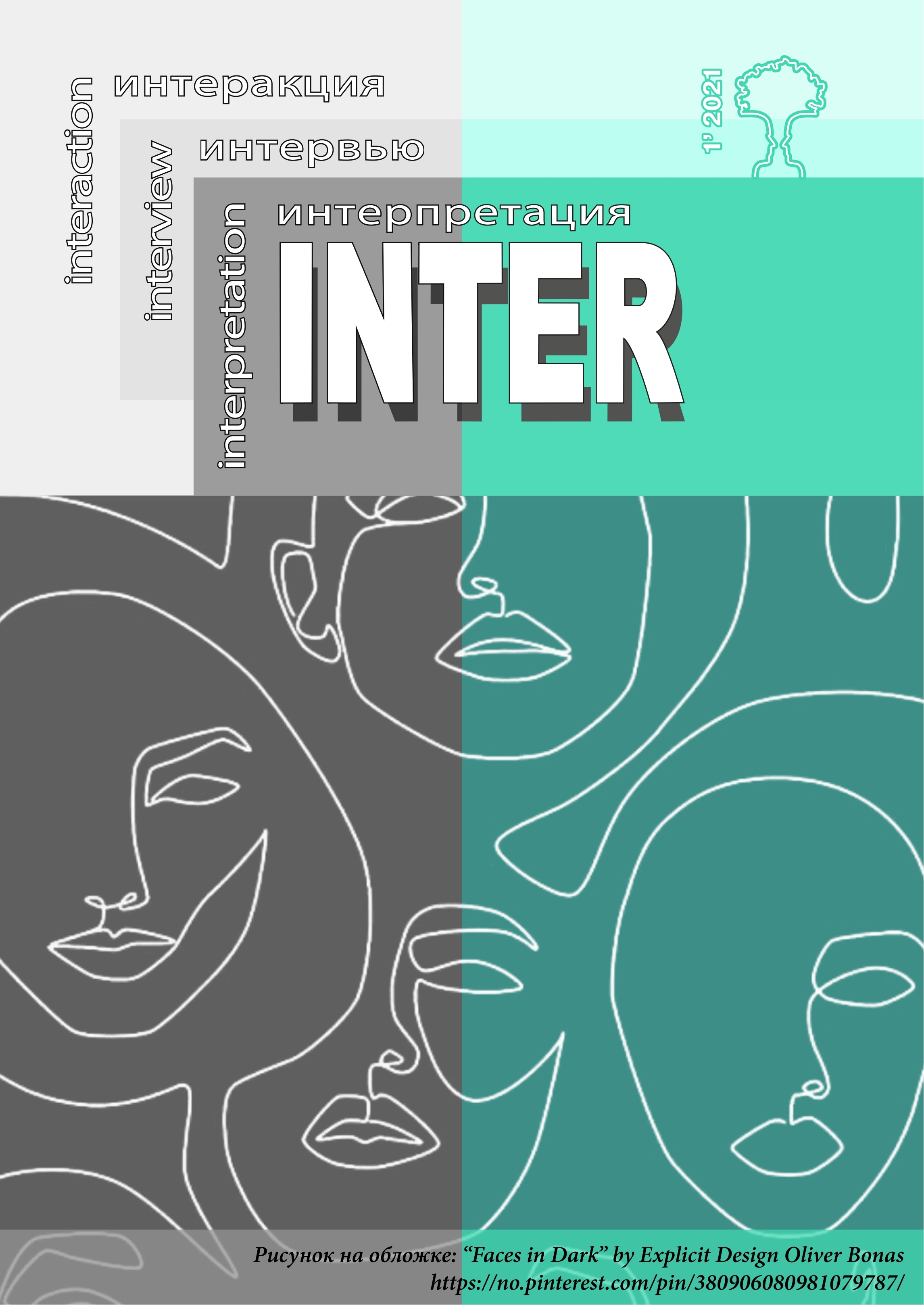 ИНТЕР №1 (2021)
Том 13 № 1 (2021)Наш журнал всегда держит в поле зрения два аспекта проблематики качественных методов, которые волнуют нас как исследователей: «как делать глубинное исследование» и «что дает такое изучение». В этом номере мы пополняем нашу Интер-энциклопедию материалами о таких важных для качественной парадигмы концептах, как “grounded theory” и «устная история». А среди эмпирических статей предлагаем подборку по социальным аспектам медицины. Кроме того, читателя ждет текст о фемвертайзинге - визуальном воплощении новых гендерных стереотипов, и об интенсивном родительстве, где объектом изучения становится достаточно нетрадиционный сегмент семейной структуры — высокоресурсные многодетные семьи.
ИНТЕР №1 (2021)
Том 13 № 1 (2021)Наш журнал всегда держит в поле зрения два аспекта проблематики качественных методов, которые волнуют нас как исследователей: «как делать глубинное исследование» и «что дает такое изучение». В этом номере мы пополняем нашу Интер-энциклопедию материалами о таких важных для качественной парадигмы концептах, как “grounded theory” и «устная история». А среди эмпирических статей предлагаем подборку по социальным аспектам медицины. Кроме того, читателя ждет текст о фемвертайзинге - визуальном воплощении новых гендерных стереотипов, и об интенсивном родительстве, где объектом изучения становится достаточно нетрадиционный сегмент семейной структуры — высокоресурсные многодетные семьи. -
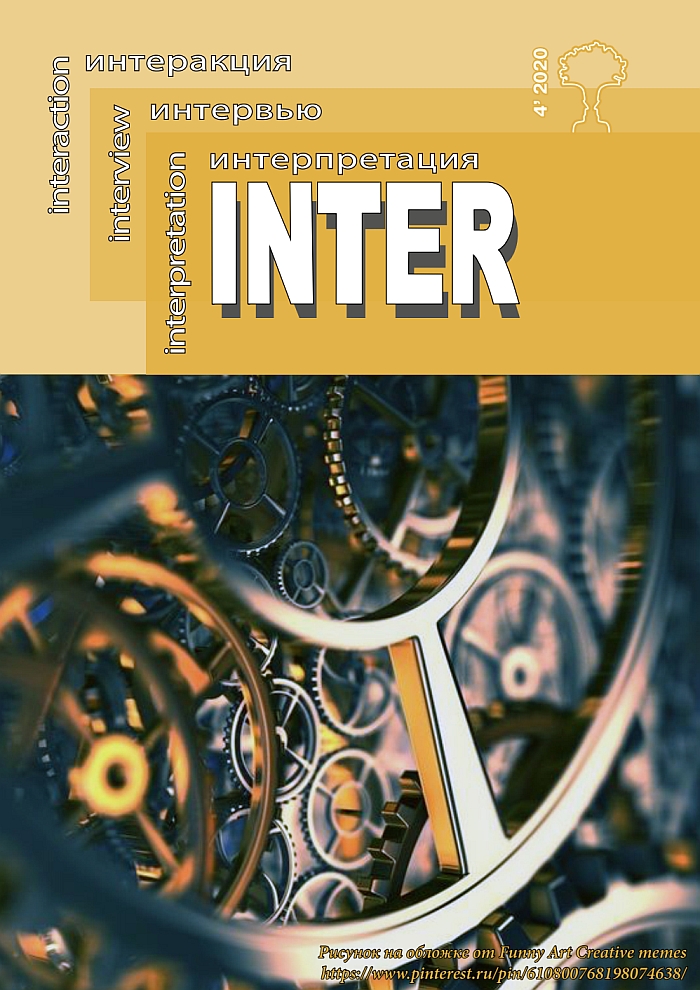 ИНТЕР №4 (2020)
Том 12 № 4 (2020)Драматичной характеристикой этого года для всех стал уникальный опыт пандемии, который перемешал темпоральности как повседневности, так и привычной цикличности жизни, а также институций. В данном номере мы обращаемся к различным аспектам темпоральности социальной жизни (теоретическая работа В. К. Шеллер «Понимание, видение и репрезентация времени в темпографии», три эссе-размышления социологов о сложном времени пандемии). Также в номер вошли статьи по итогам различных полевых исследований и новый текст в ИНТЕР-энциклопедии качественных методов (методология и методика нарративного интервью).
ИНТЕР №4 (2020)
Том 12 № 4 (2020)Драматичной характеристикой этого года для всех стал уникальный опыт пандемии, который перемешал темпоральности как повседневности, так и привычной цикличности жизни, а также институций. В данном номере мы обращаемся к различным аспектам темпоральности социальной жизни (теоретическая работа В. К. Шеллер «Понимание, видение и репрезентация времени в темпографии», три эссе-размышления социологов о сложном времени пандемии). Также в номер вошли статьи по итогам различных полевых исследований и новый текст в ИНТЕР-энциклопедии качественных методов (методология и методика нарративного интервью). -
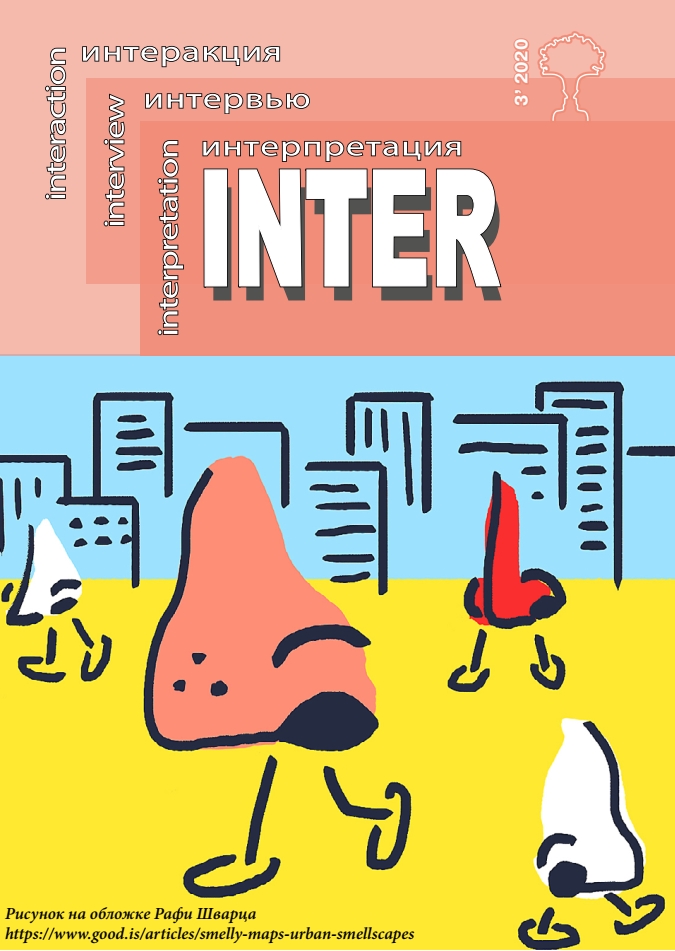 ИНТЕР №3 (2020)
Том 12 № 3 (2020)В новом номере - статьи о городских запахах, о дизайне денег, о гендерных сценах, а также новая рубрика - ИНТЕР-энциклопедия качественных методов - для кратких статей, описывающих методический арсенал качественных методов и основные понятия качественного исследовательского процесса.
ИНТЕР №3 (2020)
Том 12 № 3 (2020)В новом номере - статьи о городских запахах, о дизайне денег, о гендерных сценах, а также новая рубрика - ИНТЕР-энциклопедия качественных методов - для кратких статей, описывающих методический арсенал качественных методов и основные понятия качественного исследовательского процесса. -
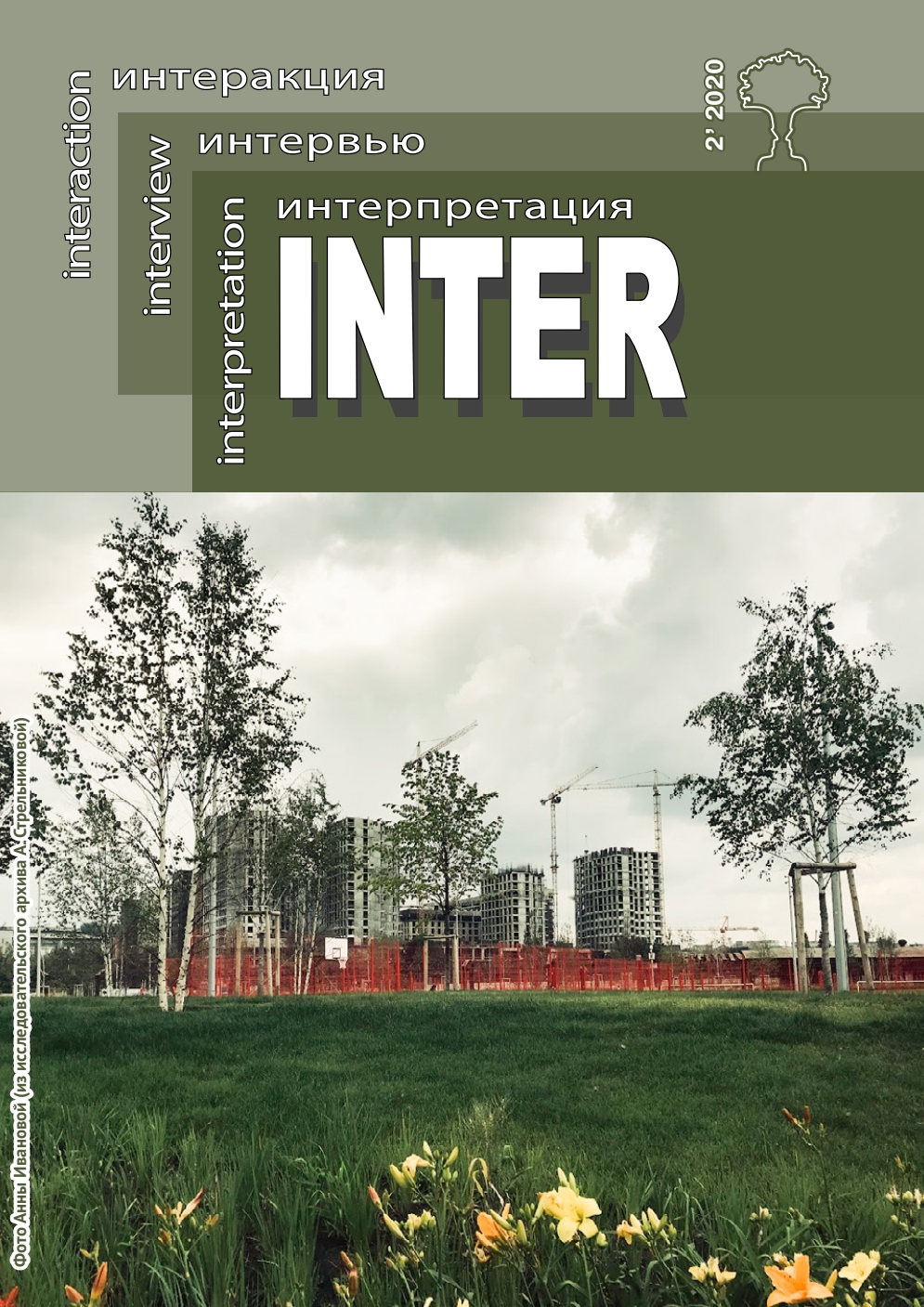 ИНТЕР №2 (2020)
Том 12 № 2 (2020)Читатель этого номера узнает, какой ритуал лежит в основе Дня амурского тигра во Владивостоке и что с этим ритуалом происходит в настоящее время, о чем помнит малый город в Вологодской области, нужен ли городским исследователям еще один метафорический концепт, как использовать возможности геолокационных данных, и как эмоции связаны с социальным неравенством.
ИНТЕР №2 (2020)
Том 12 № 2 (2020)Читатель этого номера узнает, какой ритуал лежит в основе Дня амурского тигра во Владивостоке и что с этим ритуалом происходит в настоящее время, о чем помнит малый город в Вологодской области, нужен ли городским исследователям еще один метафорический концепт, как использовать возможности геолокационных данных, и как эмоции связаны с социальным неравенством. -
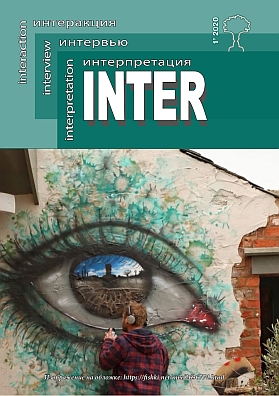 ИНТЕР №1 (2020)
Том 12 № 1 (2020)В номере представлены статьи о сложностях коммуникативных процессов и рефлексии вслед неудачному интервью, о темных сторонах организационной жизни и их визуализации, о том, как фотоданные репрезентируют контекст полевого исследования, и другие материалы.
ИНТЕР №1 (2020)
Том 12 № 1 (2020)В номере представлены статьи о сложностях коммуникативных процессов и рефлексии вслед неудачному интервью, о темных сторонах организационной жизни и их визуализации, о том, как фотоданные репрезентируют контекст полевого исследования, и другие материалы. -
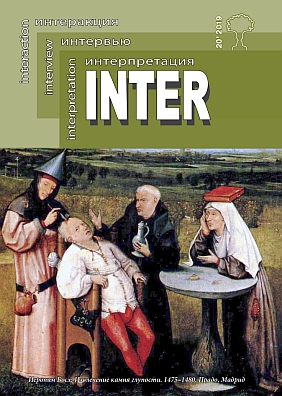 ИНТЕР №20
Том 11 № 20 (2019)В номере: тематическая подборка статей по социологии медицины (среди авторов: В.Лехциер, А.Чирикова, С.Старцев, О.Михайлова), перевод статьи П. и П. Адлер о десятилетиях этнографических исследований, результаты полевых исследований (от поиска идентичностей спального района до семейных потребительских практик), эссе по визуальной социологии.
ИНТЕР №20
Том 11 № 20 (2019)В номере: тематическая подборка статей по социологии медицины (среди авторов: В.Лехциер, А.Чирикова, С.Старцев, О.Михайлова), перевод статьи П. и П. Адлер о десятилетиях этнографических исследований, результаты полевых исследований (от поиска идентичностей спального района до семейных потребительских практик), эссе по визуальной социологии. -
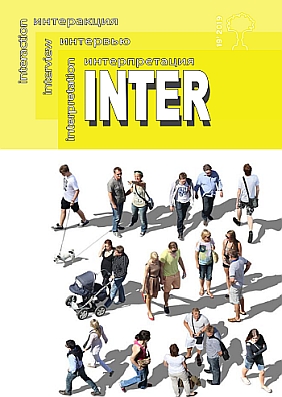 ИНТЕР №19
Том 11 № 19 (2019)В номере: дискуссия о перспективах развития российской социологии в ХХ1 веке, результаты исследований о переходе к взрослости воспитанников приемных семей, о потреблении в контексте аскетизма, о социальной незащищенности фрилансеров, и другие материалы.
ИНТЕР №19
Том 11 № 19 (2019)В номере: дискуссия о перспективах развития российской социологии в ХХ1 веке, результаты исследований о переходе к взрослости воспитанников приемных семей, о потреблении в контексте аскетизма, о социальной незащищенности фрилансеров, и другие материалы. -
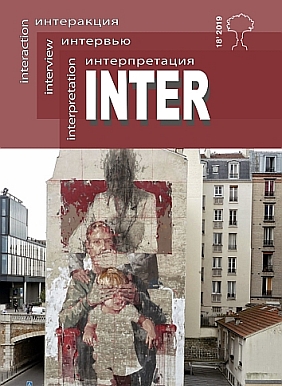 ИНТЕР №18
Том 11 № 18 (2019)В номере обсуждаются городские идентичности, воспоминания о прошлом, тематика ностальгии.
ИНТЕР №18
Том 11 № 18 (2019)В номере обсуждаются городские идентичности, воспоминания о прошлом, тематика ностальгии. -
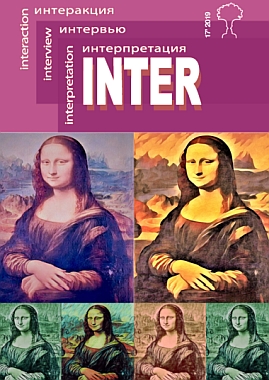 ИНТЕР №17
Том 11 № 17 (2019)В номере: круглый стол по гендерным исследованиям, статья о женских страхах в городском пространстве, размышления о политике памяти, и другое.
ИНТЕР №17
Том 11 № 17 (2019)В номере: круглый стол по гендерным исследованиям, статья о женских страхах в городском пространстве, размышления о политике памяти, и другое. -
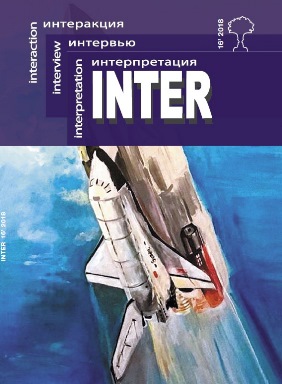 ИНТЕР №16
Том 10 № 16 (2018)Данный номер фокусируется на этнографической полевой работе как одной из разновидностей качественного исследования, вбирающего многие сопредельные дисциплины. Ключевым словом здесь является «полевая работа» с императивом выйти за пределы (собственной идентичности, кабинета, социальной группы, культуры, эпохи…).
ИНТЕР №16
Том 10 № 16 (2018)Данный номер фокусируется на этнографической полевой работе как одной из разновидностей качественного исследования, вбирающего многие сопредельные дисциплины. Ключевым словом здесь является «полевая работа» с императивом выйти за пределы (собственной идентичности, кабинета, социальной группы, культуры, эпохи…). -
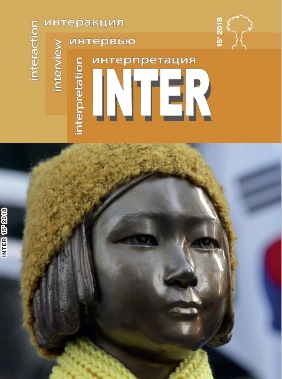 ИНТЕР №15
Том 10 № 15 (2018)Материалы этого номера свидетельствуют об экстраполяции качественной методологии на «соседние» области: культурно-экономические аспекты (проблема коммодификации в процессе становления экономики развлечений, особенности женского труда на производстве, размышления об «идейных» прекариях); этнографические экспедиционные заметки; исторические сюжеты, связанные с памятью о российском и советском прошлом.
ИНТЕР №15
Том 10 № 15 (2018)Материалы этого номера свидетельствуют об экстраполяции качественной методологии на «соседние» области: культурно-экономические аспекты (проблема коммодификации в процессе становления экономики развлечений, особенности женского труда на производстве, размышления об «идейных» прекариях); этнографические экспедиционные заметки; исторические сюжеты, связанные с памятью о российском и советском прошлом. -
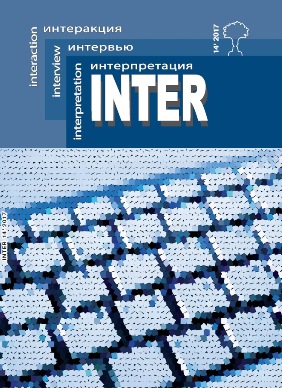 ИНТЕР №14
Том 9 № 14 (2017)В номере - исследовательские дискурсы о профессиях и профессионализме, а также углубленное рассмотрение "айтишников" как социально-профессиональной группы.
ИНТЕР №14
Том 9 № 14 (2017)В номере - исследовательские дискурсы о профессиях и профессионализме, а также углубленное рассмотрение "айтишников" как социально-профессиональной группы. -
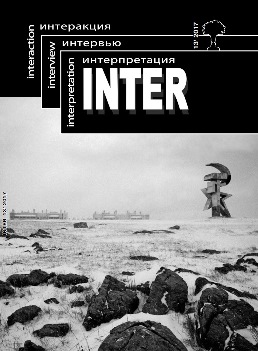 ИНТЕР №13
Том 9 № 13 (2017)В одном из первых выпусков журнала мы анонсировали визуальный поворот социологии и описывали возможные перспективы визуальных исследований социального. Теперь, спустя годы, мы могли бы констатировать, что метафора «поворота» оказалась удачной, открыла путь и теперь, совершив круг, описывает теперь уже широкое поле визуальных исследований. В номере: укоренение визуальности в социологии города, музейных исследованиях, в интересе к массиву визуального в Интернете, в неизменной компоненте визуального в самопрезентациях индивидов и групп.
ИНТЕР №13
Том 9 № 13 (2017)В одном из первых выпусков журнала мы анонсировали визуальный поворот социологии и описывали возможные перспективы визуальных исследований социального. Теперь, спустя годы, мы могли бы констатировать, что метафора «поворота» оказалась удачной, открыла путь и теперь, совершив круг, описывает теперь уже широкое поле визуальных исследований. В номере: укоренение визуальности в социологии города, музейных исследованиях, в интересе к массиву визуального в Интернете, в неизменной компоненте визуального в самопрезентациях индивидов и групп. -
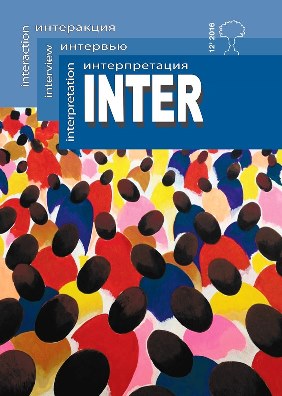 ИНТЕР №12
Том 8 № 12 (2016)В номере: дискуссия о визуализации телесности, исследования памяти, материалы полевых исследований.
ИНТЕР №12
Том 8 № 12 (2016)В номере: дискуссия о визуализации телесности, исследования памяти, материалы полевых исследований. -
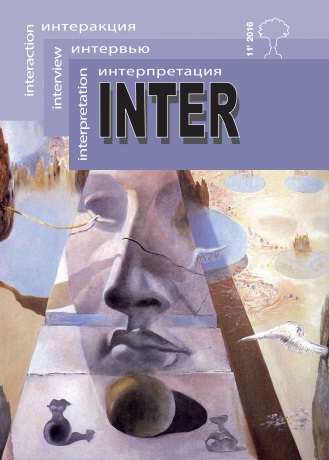 ИНТЕР №11
Том 8 № 11 (2016)В номере: дискуссия о городских жителях и производстве пространства, а также исследования о различных формах прекарной занятости: о стратегиях сопротивления неравенству взаимоотношениях мигранток-домработниц и их работодателей, о нестабильной занятости в зарубежных исследованиях, о дистрибьюторах в сетевом маркетинге.
ИНТЕР №11
Том 8 № 11 (2016)В номере: дискуссия о городских жителях и производстве пространства, а также исследования о различных формах прекарной занятости: о стратегиях сопротивления неравенству взаимоотношениях мигранток-домработниц и их работодателей, о нестабильной занятости в зарубежных исследованиях, о дистрибьюторах в сетевом маркетинге. -
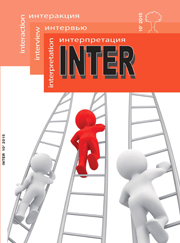 ИНТЕР №10
Том 7 № 10 (2015)Номер посвящен исследованиям социальной мобильности. Представлены 2 материала о социальной мобильности молодежи: тройная рефлексия (Е.Л. Омельченко, Г.А. Сабирова, Я.Н Крупец) и статья о сельской молодежи (П.Е.Сушко), статья о восприятии социального положения рабочего (Н.Ю. Кремнева, Е.Л. Лукьянова), 2 материала о пространственных проекциях социальной мобильности (А.В. Стрельникова и М.С.Балакирева), о жилищных траекториях (Е.В. Полухина, А.Р. Горяйнова), а также методическая статя о мобильных методах (К.П. Глазков, А.В. Стрельникова).
ИНТЕР №10
Том 7 № 10 (2015)Номер посвящен исследованиям социальной мобильности. Представлены 2 материала о социальной мобильности молодежи: тройная рефлексия (Е.Л. Омельченко, Г.А. Сабирова, Я.Н Крупец) и статья о сельской молодежи (П.Е.Сушко), статья о восприятии социального положения рабочего (Н.Ю. Кремнева, Е.Л. Лукьянова), 2 материала о пространственных проекциях социальной мобильности (А.В. Стрельникова и М.С.Балакирева), о жилищных траекториях (Е.В. Полухина, А.Р. Горяйнова), а также методическая статя о мобильных методах (К.П. Глазков, А.В. Стрельникова). -
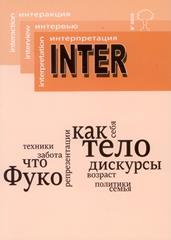 ИНТЕР №9
Том 7 № 9 (2015)В новом выпуске журнала «Интеракция. Интервью. Интерпретация» мы решили сместить акцент с единой тематической направленности и перейти к разнообразию тем и подходов, которые представлены в статьях авторов настоящего номера. Однако объединяющей рамкой по-прежнему осталась наша приверженность качественной методологии в теоретических и эмпирических проектах. Несмотря на тематическое разнообразие, сборный номер включил статьи исследователей, которые так или иначе поднимают вопросы, связанные с такими динамично развивающимися направлениями, как социология тела, гендера, семьи и детства.
ИНТЕР №9
Том 7 № 9 (2015)В новом выпуске журнала «Интеракция. Интервью. Интерпретация» мы решили сместить акцент с единой тематической направленности и перейти к разнообразию тем и подходов, которые представлены в статьях авторов настоящего номера. Однако объединяющей рамкой по-прежнему осталась наша приверженность качественной методологии в теоретических и эмпирических проектах. Несмотря на тематическое разнообразие, сборный номер включил статьи исследователей, которые так или иначе поднимают вопросы, связанные с такими динамично развивающимися направлениями, как социология тела, гендера, семьи и детства. -
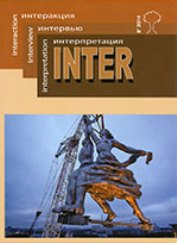 ИНТЕР №8
Том 6 № 8 (2014)В номере представлено обсуждение таких теоретико-методологических вопросов, как комбинация качественного и количественного подходов при изучении поколений, надежность качественных методов, анализ географической мобильности как проявления многомерной социальной мобильности. Также предлагаются статьи о коллективной памяти и визуализациях памяти, подготовленные на материалах полевых исследований.
ИНТЕР №8
Том 6 № 8 (2014)В номере представлено обсуждение таких теоретико-методологических вопросов, как комбинация качественного и количественного подходов при изучении поколений, надежность качественных методов, анализ географической мобильности как проявления многомерной социальной мобильности. Также предлагаются статьи о коллективной памяти и визуализациях памяти, подготовленные на материалах полевых исследований. -
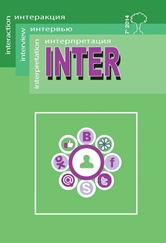 ИНТЕР №7
Том 6 № 7 (2014)Если предыдущие наши номера в основном были посвящены ретроспективе социального, то этот номер больше ориентирован на перспективу — на возможности и последствия формирования интернет-пространства как новой сферы социальности. Социологию интернета можно назвать одной из наиболее интенсивно развивающихся областей социологии, что в основном связанно с рассмотрением интернета как нового способа получения социальной информации. Авторов данного номера интернет интересует, скорее, как новая среда социального обитания индивидов, как проблематика интернет-сообществ и формирования интернет-солидарностей.
ИНТЕР №7
Том 6 № 7 (2014)Если предыдущие наши номера в основном были посвящены ретроспективе социального, то этот номер больше ориентирован на перспективу — на возможности и последствия формирования интернет-пространства как новой сферы социальности. Социологию интернета можно назвать одной из наиболее интенсивно развивающихся областей социологии, что в основном связанно с рассмотрением интернета как нового способа получения социальной информации. Авторов данного номера интернет интересует, скорее, как новая среда социального обитания индивидов, как проблематика интернет-сообществ и формирования интернет-солидарностей. -
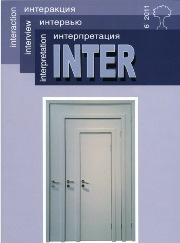 ИНТЕР №6
Том 5 № 6 (2011)Этот выпуск посвящен феномену памяти в социальных исследованиях. Эта проблематика широко дискутируется в исторических, устно-исторических, психологических, психоаналитических, визуальных штудиях. Но сужение фокуса, продиктованного социологическим подходом, потребовало соотнесения понятия памяти в ее различных коннотациях — историческая память, коллективная память, социальная, память места, коммеморация и др., — для обозначения границ собственно социологического подхода.
ИНТЕР №6
Том 5 № 6 (2011)Этот выпуск посвящен феномену памяти в социальных исследованиях. Эта проблематика широко дискутируется в исторических, устно-исторических, психологических, психоаналитических, визуальных штудиях. Но сужение фокуса, продиктованного социологическим подходом, потребовало соотнесения понятия памяти в ее различных коннотациях — историческая память, коллективная память, социальная, память места, коммеморация и др., — для обозначения границ собственно социологического подхода. -
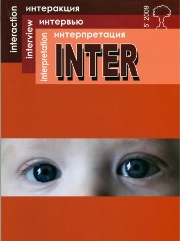 ИНТЕР №5
Том 4 № 5 (2009)Выпуск журнала посвящен теме детства. Социология открывает для себя объект социализации в удобном и доступном для анализа варианта молодежного сознания и практик, но детство остается «в концептуальной беспризорности». Словами Йенса Квортрупа, «структурные подходы к классу, расе, этничности, касте или гендеру предназначались для взрослых, в этом смысле, у детей не было своего дома в социальной теории». Поэтому в журнале представлены актуальные дебаты по социальным теориям детства. Неизбалован феномен детства и с точки зрения внимания к нему качественной социологии, несмотря на опыты детства в каждой биографической истории.
ИНТЕР №5
Том 4 № 5 (2009)Выпуск журнала посвящен теме детства. Социология открывает для себя объект социализации в удобном и доступном для анализа варианта молодежного сознания и практик, но детство остается «в концептуальной беспризорности». Словами Йенса Квортрупа, «структурные подходы к классу, расе, этничности, касте или гендеру предназначались для взрослых, в этом смысле, у детей не было своего дома в социальной теории». Поэтому в журнале представлены актуальные дебаты по социальным теориям детства. Неизбалован феномен детства и с точки зрения внимания к нему качественной социологии, несмотря на опыты детства в каждой биографической истории. -
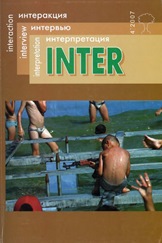 ИНТЕР №4
Том 3 № 4 (2007)Этот выпуск журнала «ИНТЕР» посвящен визуальной социологии. Парадоксально, но как таковой, признанной социологической дисциплины в пространстве российской социологии, ее не существует. Имеют место отдельные конкретно сфокусированные проекты, использующие визуальные материалы для постановки или формулирования проблем социологического характера. И западный опыт институционализации этого направления (visual studies) не оказывает существенного влияния на преодоление этого маргинального статуса в силу того, что отечественная социология должна пройти самостоятельный путь ответа на вопрос; нужна ли визуальная социология в нашем социо-культурном поле?
ИНТЕР №4
Том 3 № 4 (2007)Этот выпуск журнала «ИНТЕР» посвящен визуальной социологии. Парадоксально, но как таковой, признанной социологической дисциплины в пространстве российской социологии, ее не существует. Имеют место отдельные конкретно сфокусированные проекты, использующие визуальные материалы для постановки или формулирования проблем социологического характера. И западный опыт институционализации этого направления (visual studies) не оказывает существенного влияния на преодоление этого маргинального статуса в силу того, что отечественная социология должна пройти самостоятельный путь ответа на вопрос; нужна ли визуальная социология в нашем социо-культурном поле? -
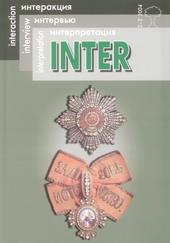 ИНТЕР №2-3
Том 2 № 2-3 (2004)Задумывая наш журнал как двуязычный, мы c самого начала ориентировали журнал на преодоление языковых барьеров в интерактивном диалоге исследователей, работающих в пространствах различных культурных контекстов, нацеливаясь на более адекватное понимание позиции «другого», прежде всего по оси Восток-Запад. Теперь мы намерены и содержательно выстраивать оси взаимных исследовательских интересов.
ИНТЕР №2-3
Том 2 № 2-3 (2004)Задумывая наш журнал как двуязычный, мы c самого начала ориентировали журнал на преодоление языковых барьеров в интерактивном диалоге исследователей, работающих в пространствах различных культурных контекстов, нацеливаясь на более адекватное понимание позиции «другого», прежде всего по оси Восток-Запад. Теперь мы намерены и содержательно выстраивать оси взаимных исследовательских интересов. -
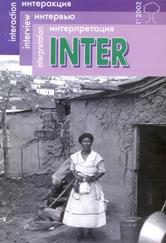 ИНТЕР №1
Том 1 № 1 (2002)Приступая к изданию журнала, мы, редакторы, исходим из убеждения, что процесс институционализации качественной социологии набирает силу. Качественная социология покинула маргинальную нишу, завоевав себе место не только в исследовательской практике, но и в системе социологического образования. Как следствие, возникла потребность в периодическом издании - чтобы обмениваться информацией, исследовательским опытом, вести методологические дискуссии, консолидируя тем самым профессиональное сообщество.
ИНТЕР №1
Том 1 № 1 (2002)Приступая к изданию журнала, мы, редакторы, исходим из убеждения, что процесс институционализации качественной социологии набирает силу. Качественная социология покинула маргинальную нишу, завоевав себе место не только в исследовательской практике, но и в системе социологического образования. Как следствие, возникла потребность в периодическом издании - чтобы обмениваться информацией, исследовательским опытом, вести методологические дискуссии, консолидируя тем самым профессиональное сообщество.
1 - 25 из 43 результатов










